






$100,000 Comerica Hatch Detroit Contest by TechTown Returns with Increased Support from
By Ebony JJ Curry SENIOR REPORTER
By Ebony JJ Curry SENIOR REPORTER
Detroit’s skyline tells a story. The Renaissance Center, towering over the city, was meant to symbolize rebirth, a bold statement about Detroit’s economic future. But for many Black Detroiters, it has long felt like a symbol of exclusion—a gleaming fortress disconnected from the communities that needed real investment. Now, Councilmember At-Large Mary Waters is demanding a shift in that narrative. She wants former Mayor Coleman A. Young’s name permanently attached to the site, ensuring that the history of Detroit’s first Black mayor is recognized in the very development he championed nearly fifty years ago.
By Ebony JJ Curry
Late Thursday night, Sept. 14, a historic moment unfolded in American labor relations as the United Auto Workers (UAW) union initiated a strike against Ford, General Motors (GM), and Stellantis. For the first time, the union took simultaneous action against all three major Detroit-based automakers. The action involves approximately 13,000 UAW members in assembly plants across Michigan, Ohio, and Missouri, who walked off their jobs after existing labor contracts expired at 11:59 p.m.


troiters. The symbolism of Black beekeepers revitalizing their city is a powerful testament to the resilience and ingenuity of our community.
Waters sent a memo to Jared Fleisher, vice president of the Rock Family of Companies, urging him to honor Young’s contributions. “Our community feels a strong connection to the legacy of the late, great mayor,” she wrote. She is pushing for his name to be incorporated into the redevelopment, making sure future generations understand the role Young played in shaping the Detroit they inherit.
n a breathtaking celebration of talent, determination, and the unyielding spirit of Black excellence, the Michigan Chronicle marked its 10th Annual 40 Under 40 event Thursday evening. This year’s soirée, drenched in the theme “All Black Everything with Gold Accents,” transcended expectations and essentially illuminated the golden gems within the true essence of Black excellence. Hosted by the charismatic duo of Andre Ash and Lynzee Mychael from Michigan Chronicle’s Finally Friday, the night was a triumph for the city of Detroit and its vibrant community of young Black professionals.
As the night unfolded, we had the privilege of honoring other outstanding individuals, each carving their own path to success. Clement “Fame” Brown, the creative mind behind Three Thirteen Detroit’s Brand Name, received the prestigious Entrepreneur of the Year Award. Brown’s commitment to empowering the city through fashion and entrepreneurship has left an indelible mark.
By Ebony JJ Curry SENIOR REPORTER
Shortly before midnight on Sept. 14, GM released a statement expressing disappointment with the strike action, despite offering what it termed an “unprecedented economic package” that included historic wage increases. Stellantis also expressed disappointment in a statement, saying the company immediately went into contingency mode to protect its operations.
The Renaissance Center was Young’s answer to a city fighting for survival. As white flight drained Detroit’s tax base and businesses moved to the suburbs, he fought to bring investment back. He backed the Renaissance Center as a way to revitalize downtown, but what was meant to be an economic catalyst became an isolated corporate hub. For years, Black Detroiters looked at the RenCen and saw something that wasn’t built for them. Waters, who recently voted against a historic review of the site, didn’t mince words: it “hasn’t meant much to Black people.”
The evening sparkled with a golden promise as we celebrated remarkable individuals from various walks of life. Among the honorees were the brilliant and visionary co-founders of Detroit Hives, Nicole Lindsey and Timothy Paul Jackson. Their work has not only changed the landscape of beekeeping and urban farming in Detroit but also exemplified the transformative impact Black professionals can have on their communities.
By Ebony JJ Curry SENIOR REPORTER
“Together we have created a social, environmental, and financial impact through bees,” said Jackson. Lindsey followed that sentiment with, “It is through our local partnerships and collaborative efforts that we exist in over 28 plus locations managing the health of 4.5 million honeybees – humbly speaking our movement has inspired others locally, nationally, and even internationally to take on similar missions.”
The UAW has branded the industrial action as the “Stand-Up Strike,” focusing on specific plants within each automaker. UAW President Shawn Fain stated, “This strategy will keep the companies guessing. It will give our national negotiators maximum leverage and flexibility in bargaining. And if we need to go all out, we will. Everything is on the table.” Union leaders have also indicated that additional plants could be targeted in future waves if negotiations remain stalled.
“Entrepreneur of the year – that’s a big deal,” said Brown. “It’s always an honor to be honored and it’s always a blessing to be in a room full of so many talented, accomplished, and popular people that look like me. I’m geeked. I started making and selling clothes as a kid and I always knew that I would have a business, but I never knew it would be Detroit’s brand name business, so I take a lot of pride in the fact that our business represents our city’s pride.”
is more than hospitals and insurance.
Greektown Had 1.4 Million Visits This Summer and
The 20th anniversary of Pancakes & Politics set the tone for a year that demands intentionality, accountability, and action. Leaders from Detroit’s most influential industries—healthcare, finance, and manufacturing—took the stage to engage in the kind of conversation that doesn’t just highlight problems but demands solutions. The voices in the room were inescapably laying out blueprints for the future of Detroit and beyond.
Taking home the Corporate Excellence Award was Dannis Mitchell, Director of Community Engagement at Barton Malow.
For many Detroiters, Interstate 375, or I-375, has long been just another stretch of urban highway, a concrete artery connecting different parts of the city. To some, it’s a mere convenience; to others, it’s an unremarkable part of their daily commute. However, there’s a deeper, far more troubling story beneath the surface of this seemingly ordinary freeway—a story of pain, displacement, and the lasting impact on Black Detroiters.
Detroit Hives, a pioneering organization founded by Lindsey and Jackson, harnesses the power of urban beekeeping to revitalize neighborhoods in the Motor City. Their initiative not only addresses critical issues like environmental conservation but also provides valuable education and employment opportunities to Black De-
DPD Chief James White Says Increased Police Presence Culled Violence
By Andre Ash
ness district that had been the lifeblood of the community.
DIGITAL ANCHOR
Dennis Archer Jr., President and CEO of sixteen42 Ventures, led the discussion with the weight of two decades of discourse behind him. The CEO panelists— Tricia Keith of Blue Cross Blue Shield, Sylvester Hester of LM Manufacturing, Gary Torgow of The Huntington National Bank, and Robert Riney of Henry Ford Health— brought an urgency to the conversation that reflected the realities Detroiters face every day.
“There is no great city that does not have a world-class healthcare campus,” he said as he spoke on the impact that Henry Ford Healthcare is taking over the city of Detroit with its new developments in the midtown area. “Now we will have the environment and space, and that’s going to put Detroit on a level to really compete.” His words underscored what’s at stake. Healthcare access shapes everything from life expectancy to economic stability. Detroit’s ability to attract top-tier medical talent, create jobs, and ensure quality care for its residents isn’t just a necessity—it’s a requirement for growth.
“It is so important to recognize that there are young leaders across the country, many that are born here in Detroit. I represent our city nationally and I tell people, ‘Yea I’m a D-girl I’m from the west-side of Detroit,’” Mitchell expressed. “But more importantly, I’ve been able to have experiences within an industry that not many of us, specifically women of color, have the opportunity to engage in and I’ve been the youngest person in the room, the only Black person in the room, and the only Sistah in the room, and I really had to articulate the importance of showing up, giving chances when others won’t, and being persistent.” As a trailblazing Black woman thriving in a predominantly male-dominated industry, her unwavering commitment to fortifying the connections between businesses and Detroit’s communities is unde-
It’s a history marred by pain, injustice, and economic devastation. More than 130,000 residents, primarily Black, were forcibly displaced. Families were uprooted, generational wealth was obliterated, and a thriving community was torn asunder. The wounds inflicted by I-375 run deep, transcending the physical barrier of a freeway to penetrate the very soul of Black Detroiters.
towards mending the wounds inflicted on Black Detroiters and restoring a sense of belonging that was so callously torn away in the past.
A string of shootings in Greektown in mid-April left both visitors and residents of this bustling downtown destination in awe. One of these shootings tragically claimed the life of a popular and beloved security guard following a dispute with a patron.
The interconnectedness of business, elected leadership, and philanthropy is something Detroit has witnessed firsthand. Hester recalled wisdom passed down from his mentor. “It’s all about people. Where they work determines where they live and how they play,” he said. Detroit is a city where work has historically defined community identity, from the auto plants to the storefronts lining the neighbor-
The I-375 Boulevard Project is about more than just correcting historical injustices; it’s about redefining the future. It will connect downtown Detroit to surrounding neighborhoods, bridging the gap that was placed upon the city decades ago.
hoods. It’s why his company, LM Manufacturing, has taken an active role in developing Detroit’s workforce beyond just hiring. “When we focus on community, we think of the kids. We are part of the DPSCD partnerships. We’ve hired over 15 kids to come back after their internships,” Hester continued. This isn’t charity—it’s investment. Keith emphasized the power of passion when it comes to making an impact. “It’s all about impact, and when you value it, you need to put your energy, time, and passion into that thing,” she said. “What we find is that we can get energy from each other. It’s important for us to push each other as leaders but have a passion for the community to drive it.” There’s a reason why Pancakes & Politics has thrived for two decades—it has never been about maintaining the status quo. Every forum has pressed for solutions, demanded more from leaders, and challenged the community to engage in change.
Riney made it clear that healthcare
This painful legacy can be traced back to the nation’s interstate highway program of 1956—a program that aimed to connect the country but often did so at the expense of marginalized communities. In the case of I-375, it meant carving a path through the
The male suspect allegedly shot the guard before fleeing the scene, while his female companion is accused of concealing the weapon in her bra.
By Andre Ash DIGITAL ANCHOR
The Detroit City Council rejected a request to make the Renaissance Center a historic district amid talks of redevelopment plans. Since reports about transforming the RenCen surfaced—including proposals that include demolishing portions of the tower campus—residents, preservationists, and public officials have begun to act to preserve the structures. That included a letter from preservationists urging the city to consider adapting the existing buildings, and several residents stunned by the potential loss of a portion of their iconic skyline asked the council to consider a historic designation study. This study would allow the Historic District Commission to review permit applications for any work within a proposed historic district for one year.
Fain clarified the union’s strategy: “I want to give a major shoutout to the thousands of members who are on the picket lines right now fighting for all of us. The Stand-Up Strike is a new approach to striking. Instead of striking all plants at once, select locals will be called on to stand up and walk out on strike. This is our generation’s answer to the movement that built our union – the sit-down strikes of 1937. We told the Big 3 that Sept. 14 was the deadline and we meant it. We gave the companies our economic demands eight weeks ago and it took more than a month to get to the table.”
The tale begins in what is now Lafayette Park, once known as Black Bottom—a neighborhood rooted in African-American culture and history. Named after its dark, fertile soil, Black Bottom flourished during the mid1900s, nurturing the dreams and aspirations of prominent Detroiters like Coleman Young, Joe Louis, and numerous other Detroit legends. But in the name of urban renewal in the 1950s, this vibrant neighborhood was systematically dismantled, erased from the map, and replaced by a lifeless stretch of asphalt.
A Holistic Approach to Providing Shelter and Support for Detroit’s Unhoused People
On the other side are stakeholders and supportive residents who view any future plans for the RenCen—even demolishing portions or all of it—as a viable path to create jobs, opportunities, and a flourishing riverfront. During the council session, members overwhelmingly voted 8-1 to deny the historic review, with Council Member Angela Whitfield-Calloway being the lone
While the residential areas bore the brunt of this demolition, the heart of Black Bottom, its thriving business center, remained largely untouched. Restaurants, theaters, clubs, and bars—the very places that brought Detroit’s Black community together—were concentrated around Hastings Street, the epicenter of African-American culture in the city.

These incidents unfolded during an unseasonably warm spring, leading to increased pedestrian traffic and heightened tensions in the densely populated downtown
The surge in crime and the influx of visitors to Detroit’s downtown core garnered the attention of the Detroit Police Department (DPD), catching them somewhat
Today, the resurgence of Paradise Valley stands as a testament to the indomitable spirit of Black Detroiters and the enduring legacy of Black excellence. This historic district, once a vibrant hub for Black businesses and culture, is experiencing a renaissance that harkens back to its glory days. The destruction of Black Bottom may have torn apart a thriving community, but the resolute determination of a new generation of entrepreneurs and visionaries is reclaiming that lost legacy.
Homelessness continues to plague urban communities, with families and individuals grappling with the challenges of making ends meet in today’s economic climate. Whether it’s struggling to meet monthly mortgage payments or coping with soaring rental costs in a housing market marked by shockingly high prices, a variety of factors contribute to the growing issue of people becoming unhoused.
See RENAISSANCE CENTER Page A-2
The union is pushing for a comprehensive list of demands. This
Meagan DunnJulie Schneider
Then, in a cruel twist of fate, Hastings Street, too, was obliterated a few years later, making way for the construction of I-375. This marked the final blow, sealing the fate of Black Bottom and signaling the beginning of the end for Paradise Valley, the Black busi-
Historically, shelters have provided a temporary respite for those in need, often serving as the first or second option after exhausting alternatives like staying with friends or family. Shelters offer a place to rest one’s head and a warm meal, albeit sometimes for extended periods. For others, being unhoused means living in cars or makeshift outdoor
James White, Chief of Police for the Detroit Police Department, said: “We were caught somewhat flat-footed right out the gate. By design we went into the spring deployment, which is less than the mid-summer deployment, and saw we say an uptick in violence that first warm weekend.”
Torgow connected the dots between financial investment and community health. “The health of the community really resides in the things that we do for each other,” he said. A thriving city requires strong financial backing, and that backing has to be reinvested into the people who live there. Torgow pointed to the partnership between him and Hiram E. Jackson, CEO of Real Times Media and Michigan Chronicle publisher, for S.W.A.G. (Students Wired for Achievement and Growth), a program investing directly in youth. “It starts with children in the community. We are a successful company, and we make a lot of profit, and we’re taking that and pouring into the community,” he said.
Chief White attributes the violence in Greektown to a combination of weather conditions and a surge in pop-
In the heart of Paradise Valley, Blackowned businesses are not just flourishing but thriving, offering diverse services, products, and experiences that pay homage to the past while paving the way for a prosperous future. From jazz clubs to soul food restaurants, the Black Press, and art galleries to fashion boutiques, this revival is breathing life into the very essence of what once made this neighborhood a vibrant cultural epicenter. It’s a resurgence that extends beyond brick and mortar; it represents the resurgence of a spirit that refuses to be subdued.
Detroit’s transformation isn’t just about big investments—it’s about ensuring that those investments reach the people who need them the most. “The more you do for
Fueled by more than $100 million from the Infrastructure Investment and Jobs Act and other partners, this ambitious project aims to create jobs, remove barriers to economic growth, and reconnect the neighborhood with the rest of Detroit. It is a step
He explained, “ We saw numbers downtown that we have not seen, ever. People are emerging from COVID and there’s a feeling that we’re in a post-COVID era… and with the venues downtown and the reasons to come down with all the activities that are going on, we saw hundreds of more people and, in particularly, young folks, teenagers that we hadn’t seen.”
Detroit City Councilman Fred Durhal III, representing District 7, where Eastern Market resides, told the Michigan Chronicle, “It’s still very early in the process, MDOT is

By Ebony JJ Curry SENIOR REPORTER
By Lynzee Mychael MULTIMEDIA JOURNALIST
The causes of homelessness are as diverse and complex as the individuals experiencing it. In response, the City of Detroit has adopted a holistic approach to combat this issue.
“Providing services and high-quality housing to persons at risk of or who are experiencing homelessness is a key priority of the City of Detroit, said Julie Schneider, Director of Detroit’s Housing and Revitalization Department.
What a Federal Government Shutdown Could Mean for Detroiters?
“This means focusing on building the pipeline of supportive housing and coordinating with the Continuum of Care on the delivery of critical resources such as emergency shelter, rapid rehousing, and diversion and prevention programs. It also means preserving and expanding affordable housing options for Detroiters of all incomes and improving housing stability though comprehensive service offerings available through the Detroit Housing Resource HelpLine and Detroit Housing Services Division within HRD.”

tion, which has pledged $10 million over three years to fund the program. Wayne Metro Community Action Agency manages the helpline, making it accessible to all Detroit residents. This initiative simplifies access to the City’s various housing services, ensuring that residents in need can easily find assistance.
“The city and its partners offer a lot of great services to help Detroiters with their housing needs, but they don’t mean much if people don’t know how to access them,” said Mayor Mike Duggan. “Thanks to the efforts of our partners and the generous support of the Gilbert Family Foundation, we now have a simple process to guide residents to the right housing resource and a growing number of programs to help them.”
The fight for civil rights did not end with the Voting Rights Act. For Black Michiganders, the struggle extends far beyond the ballot into policies that dictate access to wealth, education, safety, and representation. Michigan is home to over 1.5 million Black residents, surpassing states historically tied to Black political power, yet deep inequities persist. The policies on the table in Michigan’s legislature could either dismantle these injustices or reinforce them, making this moment a defining one for racial equity in the state.
In May 2023, the City of Detroit launched the Detroit
From the days of the Great Migration when thousands of Black families flocked to Detroit in search of jobs and a better life, to the pivotal role they played in the city’s cultural and musical heritage, Black Detroiters have left an indelible mark on the city. However, in recent years, Detroit has experienced significant gentrification, which has raised concerns about the displacement of long-standing Black residents. Similar to a setting sun, there’s a rising spirit, and Black Detroiters are reclaiming their place in the city, despite the challenges posed by gentrification.
The Gilbert Family Foundation’s broader commitment involves pledging $500 million to support projects across Detroit over the next ten years, with housing initiatives being a significant part of their contribution.
Notably, Detroit has witnessed a consistent decrease in recent years, with the number of unhoused residents steadi ly declining. In 2019, approximately 7,847 people were unhoused and entered the City’s community response system. In 2021, about 5,687 people experienced homelessness.
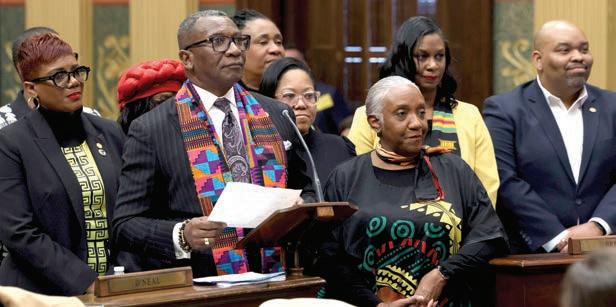
Responding swiftly to the surge in violence, DPD adjusted its deployment plans. Rather than waiting for mid-summer, they deployed officers in the spring itself to address the situation.
The rise in visitors to the Greektown area is evident in data from Placer.ai, a location analytics company specializing in visit trends and demographic insights through geolocation-enabled mobile devices. From May 1-Aug. 27, 2022, there were 1.3 million visits and 655,000 visitors to Greektown, according to Placer.ai. In the same period this year, these numbers increased to 1.4 million visits and 670,000 visitors.
because of discrimination, but they were also coming because Black people was doing some stuff. When did Black people start doing things in the city? They started doing things in this area in the 1800’s. In
As Detroit’s downtown area continues to attract both residents and visitors, the police department has implemented various enforcement measures to manage the increased population. Notably, metal detectors have been strategically placed throughout Greektown to deter the illegal carrying of firearms.
According to the City of Detroit, since the start of the fiscal year 2019 to 2021, Detroit saw a 28% decrease in the
The Michigan Legislative Black Caucus (MLBC) and the Black Leadership Advisory Council (BLAC) have outlined clear priorities to address economic disparities. Pay transparency laws are among their top legislative goals, as wage gaps remain a pervasive issue. Despite having comparable experience and education, Black workers consistently earn less than their white
counterparts. The adoption of these laws would provide accountability for employers and help close the racial wage gap, but the political will to pass such reforms remains uncertain.
During the Great Migration, thousands of Black families from the South came to Detroit in search of jobs in the booming automobile industry. Despite facing discrimination and segregation, they built vibrant communities on the city’s east
“In 2020 we heard the phrase Black Lives Matter, but do we really know what that means?” posed author Dr. Andre Perry, senior fellow and director of the Center for Community Uplift at the Brookings Institution. “In my new book Black Power Scorecard, I actually measure the most important factors on life
expectancy itself and what we find, no surprises here, is that homeownership, income, business ownership, air quality, family structure, safety, are some of the most important factors whether or not Black people are living well or not in their community. So, when we’re talking about, what should Black people rally behind? It should be for policies
“We have strategically placed them at key points, “ Chief White explains. It has been a deterrent for some, and some have tested it. If you are legally carrying a weapon and carrying a CPL, have a great day. If you’re
BLAC’s 2024 recommendations call for an increase of at least $6 billion in School Aid Fund revenue and a permanent weighted funding formula, which would allocate resources based on student needs. Universal early education for children ages 0-3 is also a priority, as research overwhelmingly shows the impact of early learning on long-term academic success. Yet, without significant policy shifts, Black students will continue to be deprived of the resources necessary to succeed.
and west sides. Over time, these neighborhoods
schools were here, and its was Black businesses here,” said Jordon. “They were coming of course
Recent legislative actions threaten to worsen these disparities. House Republicans hastily and irresponsibly passed two appropriations bills this month—House Bill 4161 and House Bill 4162. HB 4161 slashes the state budget by almost 92%, gutting investments in
cine and healthcare, may be adversely impacted by the decision to overturn Roe v. Wade.
women been premoment of the final. a law1931 law effect, asked the affirm that constitucontain abortion. Our Planned Advocates of founding coalition ReproducAll, a affirm abortion and freedom in constitution,” Giroux. is that everything in aborMichigan, makes we will can patients care they
to have representalegislacollection and criminal jusrecomcollection analywith the AttorMichigan Law Standards Association Prosecutors stakeholders collect and strategically. warHouse Operations hearother would ban of noknock urging the pass and Whitmer to the leg-
embraces. transforleadership as a approach that change the syscircumstancoperating Ivory “Transformationjust do certhem view of and exdrive that because what create everyentire because
Elected officials are also working to keep Roe v. Wade intact thus holding off Michigan’s 1931 trigger ban. Governor Gretchen Whitmer released a statement saying, in part:
“The words ‘Roe overturned’ are no longer theoretical. I want every Michigander to know— no matter what happens in D.C., I’m going to fight like hell to protect access to safe, legal abortion in Michigan…”
critical areas such as state police and veterans’ services. Even more alarming, it proposes a 100% cut in the Michigan Departments of Education, Leadership, Education, Advancement and Potential, and Health and Human Services. HB 4162 slashes 25% of the school aid budget for K-12 schools, stripping away universal school meals and resources from classrooms, educators, and students. In response to these drastic cuts, State Representative Amos O’Neal (D-Saginaw) stated, “I voted no on this plan because it is irresponsible and reckless. Michigan students are already struggling in the classroom from low reading rates due to the effects of the COVID-19 pandemic—students are, frankly, behind. These cuts would further the problems we are already facing. What we need is a budget that is timely and ensures our students are receiving the best educational opportunities and teachers have the tools and resources to uplift students’ success. Passing these bills is an attack on growth and prosperity for our kids and classrooms.”
Healthcare
More than legal implications, overturning Roe v. Wade would impact several systems across the spectrum. With the potential to drive both foster and adoption numbers upward, a ban on abortions could leave many women to choose a less safe route restoring ‘back alley’ and illegal abortion practices, including self-abortions. Moreover, African American women and women of color, who already have a long-storied history with access and inclusion in medi-
islature adopts it.
The disparities extend into health care. Black communities in Michigan face higher mortality rates, lower access to primary care, and a severe shortage of Black mental health professionals. The licensing process for mental health practitioners has created systemic barriers for Black professionals entering the field, making culturally competent care even harder to access. BLAC has pushed for targeted reforms to remove these barriers, ensuring that Black Michiganders receive care from professionals who understand the cultural and historical contexts of their experiences. Until these changes are implemented, the cycle of health disparities will persist, disproportionately affecting Black communities.
Public Safety
Increase school funding: Statutory changes to increase the School Aid Fund revenue by at least $3.6 billion and establish a permanent weighted funding formula based on student and community needs and universal preschool (0-3).
Public safety policy must be reimagined. The Policing Improvement Package—House Bills 4605 and 4606— seeks to establish a Public Safety and Violence Prevention Fund, directing sales tax revenue to crime prevention programs instead of merely expanding law enforcement budgets. This shift reflects a broader movement toward addressing the root causes of violence rather than reacting to crime with increased policing. Additionally, BLAC is advocating for the reinstatement of community violence intervention legislation, which has previously provided resources for grassroots organizations working to de-escalate violence in Detroit and other high-crime areas. Without a commitment to funding these programs, the state will continue to rely on reactive, rather than preventative, measures.
Economy
Reject censorship in history instruction: Encouraging Gov. Whitmer to ensure the goal for Michigan schools should be history instruction that is presented by professionals with the subject matter expertise, pedagogical skills, and judgment necessary to present complex information to students that are grounded in provable facts and add to the understanding of modern-day America.
Economic exploitation remains a pressing issue. The payday lending industry preys on financial instability, targeting Black and low-income communities with high-interest loans that create cycles of debt. Sen. Sarah Anthony has been a leading voice in efforts to regulate these lenders, proposing legislation that would cap interest rates and protect consumers from predatory financial practices. These
Increase mental health supports for the Black community: Recommending Michigan set a goal of increasing the number of Black mental health service providers by 20% each year over five years.
people believe that they need to for themselves and others to live better lives.”
the community, the more successful you are,” Torgow added. The homeownership program is one example. “We are living in a city that believes that. Just look at the homeownership program. If we have people that have tools to lift themselves up, the community lifts up as well.” Public education remains at the heart of the city’s future. “We have to start with the Detroit Public Schools,” Torgow said. “If the schools grow and flourish, that is the future of our companies.” There’s no sidestepping the reality—education determines economic mobility, and economic mobility determines the trajectory of Detroit’s next generation.
Riney took the conversation deeper, shifting the focus to the holistic well-being of Detroit’s neighborhoods. He spoke about engaging with communities through living room meetings—a grassroots approach to understanding residents’ concerns firsthand. “It was all things that benefit a community aside from physical healthcare, like mental health, economic health, job creation,” he said. This is where the conversation went beyond policy and
reforms are not just about financial stability; they are about economic justice. Without them, Black families will continue to struggle against a system designed to keep them in debt.
Sen. Anthony’s bill introduces a pivotal change by capping the annual percentage rate (APR) for payday loans at 36%, a stark contrast to the existing rates that can soar up to 370%. This measure aims to alleviate the financial strain on individuals trapped in a cycle of debt due to excessive loan interest rates. Anthony expressed her motivation for the bill, reflecting on her experiences in Lansing, “Growing up on the southside of Lansing, I remember seeing predatory lending facilities as well as liquor stores and fast food all around me, and it always bothered me that because I came from a marginalized community, that individuals and organizations and businesses tried to basically come into our community and prey on the most vulnerable among us.”
“What we are really concerned about is the impact on our patients. Access to abortion is already out of reach for far too many Michiganders, especially Black people and people of color who face additional barriers to care as a result of systemic inequalities and institutional racism. Losing access to legal abortion will impact those communities most, forcing people to become parents or expand their families against their will. Being able to decide and control if, when and how to become a parent is central to building and living a healthy, happy life,” said Vasquez Giroux.
Beyond the scope of pro-choice versus prolife, the fight for reproductive choice is one of freedom. As Michigan officials work to ensure each woman who finds herself in the position to choose has access to care without the threat of legal action, many wonder
The health committee recommends reviewing state licensure policies to address the barriers that Black psychologists face in obtaining licensure in Michigan.
As we delve into the complexities surrounding the payday loan industry, particularly in the context of its operations within underserved communities, a pressing question emerges. It beckons us to ponder the depth and reality of the impact these financial services have on populations that are predominantly Black and Brown. These communities, often situated on the margins of financial stability, find themselves in the crosshairs of payday lending practices, which, on the surface, offer a lifeline but may, in reality, force borrowers into a cycle of debt. This situation prompts a critical examination of the ethical dimensions and social responsibilities of such lending practices. Are these services genuinely meeting an unaddressed financial need, or are they capitalizing on the economic fragility of these communities? “Michigan payday lenders disproportionately locate their stores in communities of color in rural areas,” said Anthony. “This means predatory lending has the biggest impact on family farmers, on working poor, and again on low-income individuals in every corner of our state.”
Prison Labor
Ensure equitable distribution of state health funds: Ensure all Michigan communities with a significant Black population receive adequate funds to address mental health issues.
Protecting Black voting rights: Urge state officials to remain vigilant in the fight against schemes to disenfranchise Michiganders of color.
Even the very foundation of Michigan’s legal system contains remnants of racial injustice. The state’s constitution still permits forced labor as punishment for a crime, a direct parallel to the loophole in the 13th Amendment of the U.S. Constitution. The so-called “exception clause” has long been criticized for enabling modern-day slavery under the guise of prison labor, disproportionately impacting Black individuals. Representatives Edwards and Anthony have introduced legislation to remove this language, but the battle for its passage is an uphill one.
“BLAC members have worked hard to identify the needs of the Black community and we feel these recommendations will provide a solid first step towards breaking down barriers in education, community safety, health and business,” said BLAC Co-Chair Dr. Donna L. Bell.
Prison labor has become a multi-billion-dollar industry nationwide, with incarcerated individuals—many of them Black—performing work for little to no pay. In Michigan, incarcerated workers are paid as little as 32 cents per hour, while private corporations and state institutions profit from their labor. This system, rooted in post-slavery Reconstruction laws, was deliberately designed to replace the economic void left by the abolition of slavery. Michigan is one of many
BLAC will hold a virtual town hall meeting to discuss its policy recommendations on Thursday, May 12 at 4 p.m. Join BLAC and a virtual audience in discussing the recommendations to support the Black community.
touched the heartbeat of the city. If Detroit is going to thrive, it can’t just be about hospitals, banks, or businesses operating in silos. The approach has to be comprehensive.
“Chancellor Ivery is a true transformational leader and an outstanding CEO, who is more than worthy of the CEO of the Year Award he just received, “ said Prof. James C. Mays, who teaches entrepreneurship and supply chain management at WCCCD’s Corporate College. “In his 27 years at WCCCD, Dr. Ivery has elevated WCCCD to become nationally recognized for excellence and innovation and preparing our students professionally and personally to do great things in the world.”
As the conversation inevitably shifted toward politics, panelists made it clear that leadership is bigger than any one election cycle. The Detroit mayoral race was on everyone’s minds, but Torgow reframed the discussion to emphasize long-term vision over political distractions. “America is a great country, and we’ve got the best healthcare system in the world,” he said. “It’s our job to produce the healthcare community the tools to assist our community. America is bigger than anyone who sits in office. Detroit is bigger than one person.”
what the Supreme Court will rule in the upcoming days. Despite the decision, advocates on both sides of the argument are willing to continue their pursuits.
states still operating under these exploitative policies, reinforcing the link between mass incarceration and economic exploitation.
“Overturning Roe v. Wade would be a terrible break with nearly 50 years of judicial precedent and – more importantly – a blow against individual freedom. It is my hope that the majority of justices will reject the findings of this draft. If that is not the case, we need to stand with Senate Majority Leader Schumer and Gov. Whitmer in support of their efforts to preserve the right to reproductive freedom,” said Chair Alisha Bell, on behalf of the Wayne County Commission.
Though symbolic, the proposed removal of the exception clause is a necessary step toward dismantling a legacy of racialized oppression that continues to exist in legal frameworks. Advocates argue that until these laws are abolished, slavery has not truly ended—it has simply evolved. The fact that such a provision still exists in Michigan’s constitution is a sobering reminder of how deeply systemic racism is embedded in legal structures. The push to remove this language represents a moral and legal imperative, one that requires bipartisan support and public pressure to become a reality.
Representation
Cultural recognition and representation are also part of the push for racial equity. BLAC’s proposal for a gubernatorial proclamation recognizing African Day on May 25 seeks to celebrate Michigan’s Black immigrant communities and foster connections within the African diaspora. Similarly, increased funding for the Michigan Arts Council would provide Black artists with greater opportunities, ensuring that cultural contributions from Black Michiganders are preserved and celebrated. Detroit has long been a hub for Black artistic excellence, yet Black artists often struggle to secure funding. Investing in the arts is an investment in Michigan’s cultural and economic future.
The Michigan Legislative Black Caucus has entered a new chapter with the election of State Representative Amos O’Neal (D-Saginaw) as chair in January 2025. Under his leadership, the caucus is prioritizing economic growth, education, health care, and the preservation of Black history. These policies go beyond reforming laws; they create structural change that uplifts entire communities.
“In many cases, there’s a disconnect of what the national discourse should say and what is happening on the ground. People in communities want strong families, they want good jobs, they want greater homeownership, higher income,” said Perry. “These are things that all Americans rally behind, but in particular Black people want just as much. I believe that the culture wars have distracted us from looking at basic quality of life issues that should be translated into legislation and because we have essentially moved our eyes off the goals of homeownership, business creation, business expansion, clean environments, clean water, clean air, strong families - these are the things that politicians must have a strong policy agenda for.”
The battle for equity in Michigan is far from over.
The policies under debate today will shape the future for generations of Black Michiganders. The fight is no longer about gaining access to the ballot; it is about ensuring that the power of the ballot translates into tangible policy changes. The unfinished business of civil rights demands not just discussion but action. Michigan’s leaders have a choice: uphold the status quo or take bold steps toward justice. The urgency of this moment cannot be ignored, and the time to act is now.
ter-school programs, we have to make sure they go to college, and if they can’t, we must invest and get them there. We have to invest. It’s up to us.”
“They need to have a both-and mentality rather than an either-or approach. The attributes required to lead and upscale the city are not singular—they must coexist,” said Riney. “Behavior is contagious. When people collectively believe that progress is possible, we can move to the next level. Optimism is what’s needed.”
BLAC is housed in the Michigan Department of Labor and Economic Opportunity. Members represent many professional backgrounds, including economics, law, public safety, health and wellness, arts and culture and media. They leverage their experiences and expertise to make recommendations to the governor on critical issues affecting the Black community.
Keith emphasized the power of collaboration, highlighting the importance of bringing people together under a shared vision. “People are electing leaders they want to follow, so it’s critical to set the vision and bring others along,” she said.
To learn more about BLAC and this upcoming event, visit www.michigan.gov/BLAC.
That perspective was echoed throughout the room. The work required to build a stronger city doesn’t begin or end with a single administration. It’s about consistent investment in education, infrastructure, and community development.
“In order for us to grow as a city, as a state, we must invest in our children and our teachers,” Torgow said. “We have to encourage our families, we have to do af-
childcare, and job creation. You have to meet people where they are,” he said.
These qualities—vision, collaboration, optimism, empathy, and a commitment to economic and social infrastructure—are what the panelists agree the next mayor of Detroit must embody to drive the city forward.
The message from the panel was clear. There’s no waiting for someone else to solve the problems facing Detroit. The leaders in the room have a responsibility, and so does the community. Progress comes from action, from intentionality, from understanding that investment in people is the foundation of a thriving city.






From page A-1
vote supporting it, making room for Dan Gilbert’s Bedrock team to proceed with its proposal to conceptualize a different future for one of Detroit’s most iconic buildings.
“I don’t think we have to demolish to build. I really don’t. I think we can preserve and build at the same time. I think they can coexist. And I’ve watched with a broken heart, all of our buildings be demolished, and then what’s being built now downtown are Lego-style buildings. They don’t have any kind of architectural flavor or design. They are all cookie-cutter designs,” Calloway said. “We are destroying our history… That skyline will be forever destroyed” if the city allows the developer to move forward.
During a planning and economic development committee meeting where stakeholders outlined the proposal and addressed questions, Fleisher said demolishing two towers and maintaining the rest of the properties is the “only viable path to preserving the Renaissance Center.” “Just because something can’t be the same, doesn’t mean it can’t be spectacular, and our vision is to make this and to make the riverfront spectacular,” Fleisher said. “It should be something that Detroiters cannot just see as a stale icon from afar, but can actually experience and enjoy directly. It should be something that is inclusive, not designed to exclude; that is open, inviting, accessible, and easy to navigate. It should be something that connects and integrates the rest of the city with its riverfront, doesn’t divide it. It should be something that anchors a thriving riverfront that is not just based on Navy Pier in Chicago, but that is the envy of Navy Pier in Chicago.”
Fleisher believes Detroit’s riverfront has the potential to become a major gathering place for residents and visitors alike. At a Detroit Downtown Partnership Spring Forum, he emphasized that the current design of the Renaissance Center creates too many barriers to accessing the riverfront. According to Fleisher, the redevelopment project would break down these barriers, making the riverfront a more welcoming and interactive space.
dates and the reimagining of the towers at the RenCen, it would create a clear and accessible path to the riverfront for all to enjoy.”
The push to add Young’s name to the site comes as Rock Family of Companies and General Motors work to transform the Renaissance Center into an entertainment district with affordable housing, retail, and a public promenade. As part of that redevelopment, two of the five towers—300 and 400—are slated for demolition. Waters is advocating for Tower 300 to be preserved, calling for a balance between progress and historical integrity.
Young was more than Detroit’s first Black mayor. He was a fighter, unapologetically committed to Black empowerment. He took on racist policing, expanded Black political power, and made sure that the people who built Detroit had a say in its future. He stood in the way of corporate greed, knowing that true progress meant investment in Detroit’s communities, not just its skyline.
This is bigger than a name change. It is about ownership of history. It is about recognizing that Detroit’s Black residents have been the backbone of the city’s survival and that leaders like Young fought battles that still shape Detroit today. The Renaissance Center was part of his vision, even if it didn’t fully deliver on its promise. That history deserves acknowledgment.
Waters’ proposal forces Detroit’s developers and power brokers to confront that truth. Rock Family of Companies and GM have a choice: they can build another project that prioritizes profit over people, or they can ensure that this transformation includes the recognition of a leader who fought for this city when others walked away.
Torgow stressed the significance of inspiration and leadership, particularly in shaping the future of Detroit. “We need someone who can inspire, lead the younger generation, and celebrate the progress that’s already been made while pushing Detroit toward becoming a top-ten city. We have a strong pool of candidates,” he said.
Hester added that empathy and work ethic must be at the forefront. “The next mayor has to focus on transportation,
As the opening forum of the 20th season of Pancakes & Politics unfolded, the conversation wasn’t just about where Detroit is—it was about where it’s going. This city has always been built on resilience, ingenuity, and community. The work ahead is about making sure that every investment— whether in healthcare, finance, or education—translates into real change that people can see, feel, and live.
The challenge now is to take these discussions and turn them into movement. Detroit has the blueprint. It has the leadership. It has the drive. The next step is action.
“It is too much work to get to our riverfront,” Fleisher said. “With up-
Detroit’s revitalization cannot come at the expense of its history. It cannot erase the struggles that made this city what it is. The Renaissance Center’s future is being decided now, and the question is clear—will this development honor the people of Detroit or just reshape the city for those with money to spend? If Coleman Young’s name is going to be attached to this project, it cannot be symbolic. It has to mean something. It has to stand for the city he fought for—a Detroit that works for everyone.
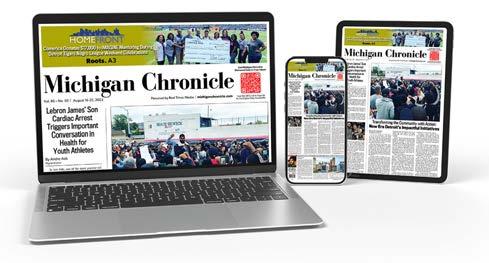

A3 | March 19-25, 2025
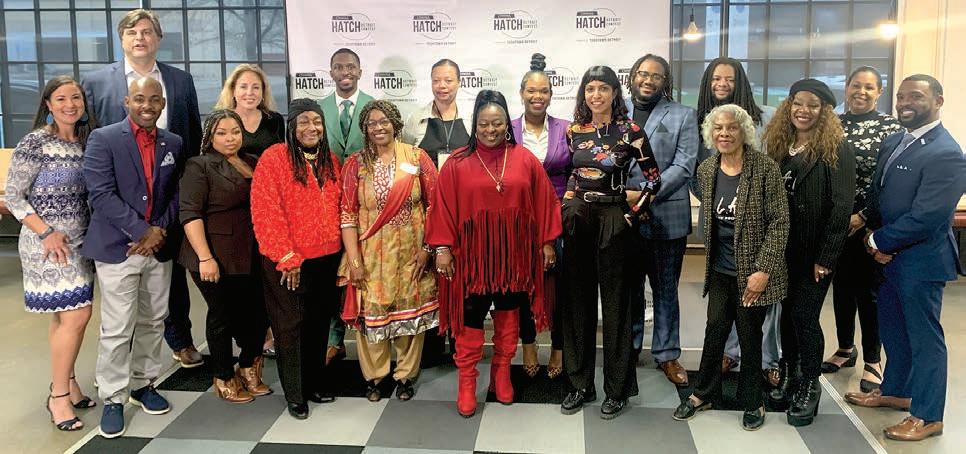
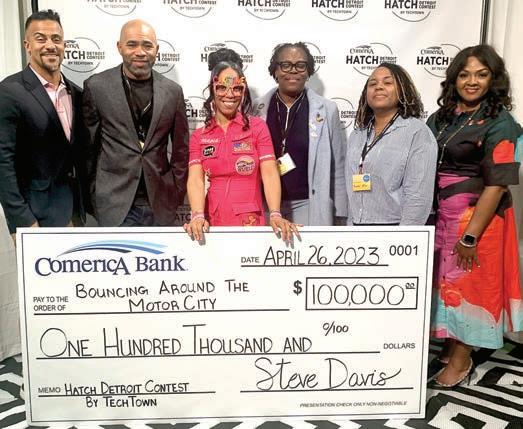
TechTown Detroit and Comerica Bank announced the return of the Comerica Hatch Detroit Contest by TechTown, a small business competition that awards $100,000 in startup funding as well as support services to one entrepreneur seeking to open a brick-and-mortar storefront in Detroit, Hamtramck or Highland Park. The competition, first launched in 2011, bolsters small business development in Detroit and will take place over the next four months, with the winning business crowned in June.
Applications, available on HatchDetroit.com, opened Monday, March 3 and will close on Friday, April 4. Entrepreneurs with a retail concept looking to establish their first brick-and-mortar location in Detroit, Hamtramck or Highland Park are eligible to apply.
“Detroit’s small business community is built on the strength of its entrepreneurs, and TechTown is proud to support these business innovators through the Comerica Hatch Detroit Contest,” said Christianne Malone, Assistant Vice President for Economic Development at Wayne State University and Chief Program Officer of TechTown Detroit. “We strive to inspire and cultivate Detroit’s small business development through top-notch entrepreneurial resources, financial support, and valuable partnerships.”
The small business contest includes two rounds of public voting to determine the Top 10 and Top 4 entrepreneurs, allowing the community to vote for their favorite business.
The competition culminates June 11 with the annual Hatch Off, where the Top 4 entrepreneurs present their business plans to a panel of judges and a live audience. There, the winner will receive the $100,000 grand prize that also includes a business support package from TechTown Detroit, Wayne State University’s entrepreneurship hub. Comerica Bank and Comerica Charitable Foundation Increase Support
As a proven launching pad for aspiring business owners, Comerica Bank and the Comerica Charitable Foundations are increasing their commitment to TechTown’s Hatch Detroit program to amplify the impact on Detroit’s small business economy.
Recognizing the cost of starting and sustaining a business has increased, and to further their commitment to ensuring the success of the Hatch Detroit program, Comerica Bank and the Comerica Charitable Foundation have increased their financial support to a combined total of $200,000 this year, a $50,000 increase from the previous three years.
“Comerica Bank was founded in Detroit more than 175 years ago, and we remain dedicated to supporting the city’s entrepreneurship and the development of small businesses that make up the lifeblood of this community,” said Meghan Storey, Comerica Bank Senior Vice President and Michigan Director of Small Business Banking.
The skin is the largest organ in the human body and imagine all the work it does. It covers the entire external surface of the body, protecting it from external factors such as UV radiation, bacteria, and physical trauma. It regulates body temperature, helps sense of touch, and excretes toxins through sweat.
The science of skin is what drew SkinBarVII owner, Sevyn, to the art of esthetics.


Vice

In addition to its financial commitment, Comerica works alongside TechTown to provide in-kind support, such as technical services for contestants, during the contest.
Since 2019, Comerica Bank has provided the $100,000 grand prize for the Comerica Hatch Detroit Contest by TechTown winner and will do so again this year. This year, Comerica Bank will also be contributing an additional $50,000, in tandem with a $50,000 grant from the Comerica Charitable Foundation, to TechTown for organizational support of the Hatch Detroit program to assist with its ongoing incubation of small businesses.
hydration, waxing, and some of the finest facial services in Detroit. Uniquely, SkinBarVII offers memberships for $100, a member can get a monthly one-hour massage, discounts on products and services, and other exclusives.

“I’ve always been a science girl,” Sevyn shares. “And I love helping people and building people’s self-esteem.”
In her view, skincare can be attached to a flaw or insecurity. “When you help a person with their skin, you help them with a lot, and it’s always challenging. So it’s never a dull moment in this industry. It’s always a challenge--there’s always a puzzle or something to figure out. And I like that, being constantly challenged keeps me sharp.”
Having been open nearly five years, SkinBarVII provides unique esthetic services to metro Detroiters and helps to educate them on the right products to care for their skin.
“Besides our skin care services, we offer health and wellness treatments,” as noted on skinbar7. com, the company’s website. “Self-Care is one of the most important things in our lives that is often forgotten due to our busy schedules.”
The business offers acupuncture, cupping, IV
“We’re just making it past that fifth-year mark where, as a business, you have some skin in the game and you learn so much about yourself, about your business, and what direction you need to go in to keep being successful. We are embarking on a new journey at the Skin Bar, and it’s pretty exciting.”
SkinBarVII is one of nearly 30 businesses this year to participate in the Detroit Pistons SHOP313 Pop-Up Shops presented By Comerica Bank.
“SHOP313 was one of those opportunities that I had done it before, didn’t take advantage of it like I should have. So this time, when I was able to do it again with Comerica, I knew what to do. I had my videographer out there, and we did a series where we interviewed fans about their skin. It was pretty interesting, and it was a fun, amazing experience. We got to talk to people, educate people, and just have a really good time.” SkinBarVII is
“Working closely with small businesses, we see extraordinary entrepreneurs rich in ideas and passion who have dedicated their lives to launching and growing a business but remain in need of resources and mentorship. Year after year, TechTown and Hatch Detroit has provided a platform of extensive technical services and guidance needed to help entrepreneurs succeed, creating a strong foundation for Detroit’s small business ecosystem,” said Storey.
Including this year’s contributions and grants, Comerica Bank and the Comerica Charitable Foundation have collectively committed over $1.3 million into Hatch Detroit since first supporting the small business program in 2012.
TechTown’s Commitment to Small Businesses and Hatch Detroit
Last year, TechTown celebrated 20 years serving Detroit as a vital incubator for small businesses and entrepreneurs, dedicated to revitalizing the city through sustainable growth by supporting tech startups and small businesses.
In 2022, Hatch Detroit was integrated into TechTown’s suite of entrepreneurial programs and services.
Adding Hatch Detroit to its small business platform strengthened one of the city’s most popular and successful entrepreneurial programs designed to transform neighborhoods through new brick-and-mortar retail shops.
Since then, Hatch Detroit alumni have opened their brick-and-mortar locations in five different neighborhoods, including: Craig’s Coffee (Midtown), JP Makes and Bakes (New Center), K Walker Initiative (Midtown), Lily’s & Elise (Livernois Avenue of Fashion), Next Chapter Books (East Indian Village), Shell Shock’d Tacos (Midtown), and Sepia Coffee Project (Highland Park). The Comerica Hatch Detroit Contest by TechTown has helped create some of Detroit’s most successful and well-known businesses, including winners G.L.A.M. Body Scrubs (2024), Bouncing Around The Motor City (2023), Little Liberia (2022), 27th Letter Books (2019), Baobab Fare (2017), Meta Physica Massage (2016), Sister Pie (2014), Batch Brewery Company (2013) and La Feria (2012).
Under TechTown’s services and support, Bouncing Around the Motor City, Little Liberia and G.L.A.M. Body Scrubs are scheduled to open in 2025, along with Hatch Detroit alum Ice Cream Detroit.
In 2024, Tiffany Cartwright, founder and owner of G.L.A.M. Body Scrubs, won the Comerica Hatch Detroit Contest by TechTown . G.L.A.M. is a certified woman- and minority-owned business based in Detroit that specializes in natural, organic body scrubs. It provides jobs, training and mentorship to underserved individuals, especially women who have been victims of domestic violence and human trafficking, as well as returning citizens. Together, Hatch Detroit alumni have opened more than 50 businesses, employ more than 500 people and have invested more than $7 million in their businesses.
TechTown Detroit, Wayne State University’s
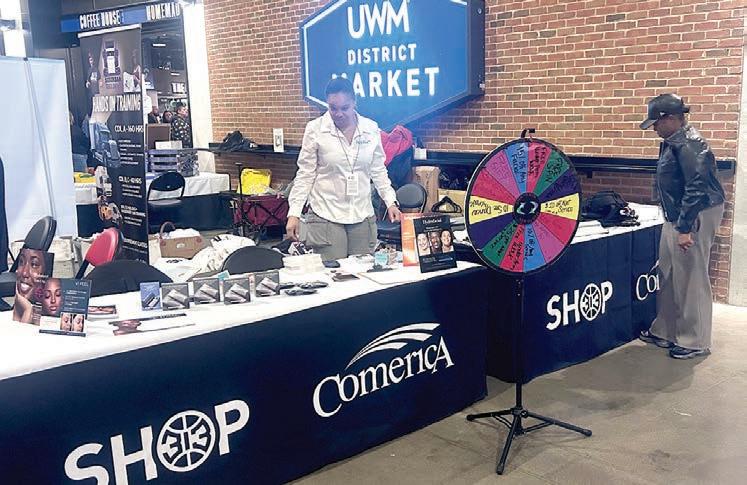
In her 1967 book How to Dress for Success Academy Award winning costume designer Edith Head said, “You can have anything in life if you dress for it.”
It is a sentiment that Alison Vaughn Smith has come to embrace. Her organization, Jackets For Jobs Inc., has been enthusiastically outfitting and providing job assistance to metro Detroit job seekers through Jackets for Jobs now for 25 years.
Since its foundation in 2000, Jackets for Jobs, has stood as a beacon of hope and empowerment, providing essential career attire and employment training to thousands in Detroit. Through its unwavering mission, the organization champions economic independence and career achievement, dressing individuals not just for the job they want, but for the success they deserve.
On March 20, 2025, at 10 a.m., Jackets for Jobs will celebrate its 25th anniversary with a star-studded gala event at Motor City Casino.
The event, entitled “Clothed in Confidence: 25 Years Strong,” will feature a keynote address by Real Housewives of Atlanta star, model and business mogul, Cynthia Bailey.
“It is an absolute honor to stand alongside Jackets for Jobs as they celebrate 25 years of empowering individuals with confidence, dignity, and opportunity,” Bailey expressed.
She added, “Clothing is more than just fabric— it symbolizes our identity and aspirations. Looking good boosts our confidence, opening doors to new possibilities. I’m thrilled to support an organization that has uplifted over 40,000 job seekers, proving that collective support can elevate us all.”
In an interview, Jackets for Jobs founder Allison Vaughn Smith shared her pride for the organization’s past quarter century and what she is looking forward to in the future.
What have been some of your reflections in this, your 25th anniversary year?
For 25 years we’ve had so many success stories of people getting job interview clothing and then calling back, or walking in and saying, “Guess what? I got the job!” That is our favorite type of accolades.”
What do you have planned for the Clothed in Confidence: 25 Years Strong event?
We have some big things planned. We will be

You have worked with Comerica on the Prom Dress Giveaway Initiative. How did that come about, and will you be doing it again?
Comerica came to me in a phone call and said that we understand that you provide business attire and clothing for job seekers, but we have an initiative that we do where we give out prom dresses and we want to know if you would like to partner. I thought it was a big undertaking, but I said, “Sure!”
For the last couple of years, we’ve been doing it, and it has been so successful. The prom dress drive has been so successful that last year, in the fall, we ended up doing a homecoming dress giveaway because we had a surplus of dresses. That’s one of the things many admire about you. You seem to always say, “Hey, let’s just give it a chance. What’s the worst that could happen?” Where does that energy come from?
acknowledging DTE Energy because they were the first company that did a clothing drive for us, 24 and a half years ago. Only six months into the program, they believed in Jackets for Jobs when we were just getting started.
events. With a passion for fashion and clothes and a purpose to serve others, Alison Vaughn Smith has transformed Jackets for Jobs from an idea to a 25-year community organization with two Detroit locations focused on assisting job seekers prepare for the workforce by removing barriers and raising self-esteem.
We will also highlight TJ Maxx. They also invested a lot into Jackets for Jobs very early on by providing clothing, volunteers, and monetary support.
And, of course, Comerica, who invested in us and believed in our mission, we partnered with giving out prom dresses to young girls in need. And that has been a wonderful and very popular initiative.
How did you come to get Cynthia Bailey as the keynote speaker for your event?
That’s kind of a big deal.
Everybody’s saying that (laughs). I think she will resonate with our clients and guests through her time on Real Housewives of Atlanta. But I chose her because she’s all about fashion and clothing. She’s a model, and as a model, you have to stand a certain way, look a certain way, present yourself a certain way.
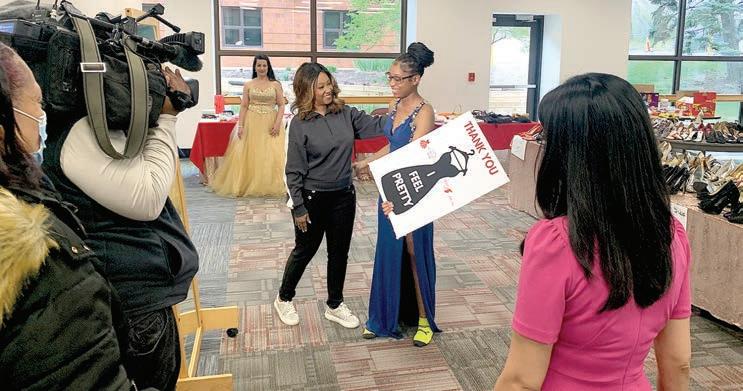
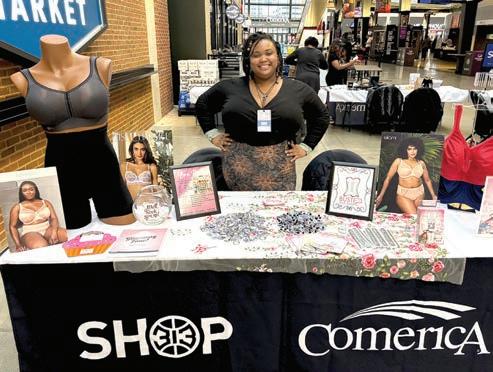
Bra Shop Fit Trainer and Store Manager Jada
at the February Detroit
God, because I know that there’s a need, and this is my calling, and this is my mission. I think if you have contact and a relationship with the Lord, He’ll tell you what to do. Once He tells you what to do, then you can flourish and go forward, and God will provide everything that you need. Any final thoughts?
Just thanking God for 25 years, and we’ll see where God leads me for the next 25 years. I enjoy making a difference, and I’m just happy to do what I do.

and
Comerica Bank to hold Seventh Annual Prom Dress Drive, Benefiting Jackets for Jobs
Public encouraged to drop-off dresses and accessories at select Comerica locations March 24-April 18
Comerica Bank is welcoming donations for its seventh annual Prom Dress Drive beginning Monday, March 24, and continuing through Friday, April 18, in support of community partner Jackets for Jobs. Nine Comerica banking centers throughout Metro Detroit will
Individuals and businesses alike can drop off new or gently used dresses,
such as jewelry, shoes, purses, and wraps, at participating Comerica
Michigan students.
For the second-consecutive year, Comerica will accept donations of dresses and accessories over a four-week span. Last year’s four-week prom dress drive garnered a record total of over 2,600 dresses donated.
“The response by our customers, colleagues and community to support our annual prom dress drive has been quite remarkable,” said Steve Davis, Comerica Bank Michigan Market President. “We appreciate everyone who helps make both the Prom Dress Drive and Jackets For Job Prom Dress Boutique possible. The generous donations and volunteer assistance positively impacts youth in our area, and we look forward to making this spring memorable for many teens in our community.”
This year marks Comerica’s third year donating dresses and accessories to Jackets for Jobs, a Detroit-based nonprofit that focuses on career development and removes barriers by providing high-quality clothing that makes clients look and feel professional to support workplace success. This year, Jackets for Jobs celebrates 25 years serving the community.
“Over the past two years, we have seen numerous teens and their families feel a great sense of relief knowing that they are able to enjoy one of the most memorable events of a high schooler’s life with less stress by removing many barriers that exist,” said Alison Vaughn, Jackets for Jobs Founder and Executive Director. “To see their reaction and emotions, in addition to their families’ reaction, when they know they have the right dress and accessories is truly a heartwarming moment knowing that they can experience these special moments.”


As a result of last year’s record prom dress drive and to extend the outreach to support youth in the community, Comerica partnered with Jackets For Jobs in hosting the first annual Homecoming Dress Boutique giveaway in September. It was the third dress boutique in two years that supported teens in Detroit and from several southeast Michigan communities.
Over the previous six Prom Dress Drives, Comerica has collected more than 10,000 dresses, including last year’s record total, to help local teens experience the high school tradition of prom. Jackets for Jobs Prom Dress Boutique
This year’s Jackets for Jobs Prom Dress Boutique will take place Friday, April 25 through Sunday, April 27 at the Samaritan Center (5555 Conner St.) in Detroit. Schools, organizations or families with teens in need can contact Jackets for Jobs at (313) 579-9160 for more information.
In February, one of those small businesses had progressed over the past 10 years from a Comerica Hatch Detroit Contest by TechTown semi-finalist to a multi-location retail store. Busted Bra Shop, founded by owner Lee Padgett, has grown her dream from inspiration to stores serving Detroit, Ann Arbor and Chicago.
“We would like to thank the Pistons SHOP313 program and Comerica Bank for honoring Busted Bra Shop as one of the small businesses of the game,” said Jada Smith, Busted Bra Shop Fit Trainer and Store Manager.
presented by Comerica Bank.
“When it comes to exposure and making connections, we would say this opportunity is definitely one for which we are grateful.”
Busted Bra Shop, now among approximately 50 Hatch Detroit alums who have opened their brick-and-mortar location, was a 2013 Comerica Hatch Detroit Contest semi-finalist.
As the Pistons defeated the Wizards, six small businesses focused on growing direct customer engagement were on display at the SHOP313 Pop-Up Shops area in the UWM Dis-
“It was an amazing experience. Being able to connect with other small business owners is always super liberating. Not only were we able to connect with local entrepreneurs, but we were also able to spread the gospel of our services to many people in the community.”
trict Market concourse to promote their brand: Grandeur Cru Wine Shop (Detroit), Hair Mechanix (multiple locations), Kacha Thai Market (Royal Oak), Motor City Mitten Mission (St. Claire Shores), New Yasmeen Bakery (Dearborn), and Victory Gym & Veterans Health Club (Wyandotte).
Additionally, a seventh business, Mullen Equipment Company (Troy), received suite access, providing them a business-to-business networking environment for clients and prospects.
The final 2025 SHOP313 Pop-Up Shops presented by Comerica takes place Friday, April 11 vs. the Milwaukee Bucks.


A5 | March 19-25, 2025
Sponsored by JPMorganChase
For many Black, Hispanic and Latino families, as well as other cultures, multigenerational living is a cherished aspect of home life. It can also be good for your family’s overall wellbeing.
Research indicates there can be financial benefits to multigenerational living, and when executed intentionally, having multiple family members under the same roof can potentially help improve health outcomes, reduce loneliness for older adults and bolster educational outcomes for children.
While multigenerational living has many positives, it also comes with a unique set of financial matters and planning needs. From saving and budgeting to dividing costs and estate planning, navigating the financial landscape of a multigenerational home calls for foresight and strategy.

Below are some financial considerations for people living in multigenerational households and those considering moving in with family members.
Helping to Build Family Wealth
In a 2022 study, the Pew Research Center found people in multigenerational households were less likely to live in poverty, and some multigenerational households had more earners than the non-multigenerational households, which can help provide a safety net in case someone loses a job. It can also encourage homeownership – 14% percent of all home buyers in the study said their purchase was motivated by a desire to accommodate multiple generations in their family.
Having Diverse Financial Needs
Savings and budgeting plans can be more complicated because of the wide range of ages among family members. Seniors might require more for health care and retirement, for example, while children can bring daycare and tuition costs. Be flexible with your planning to accommodate different saving and budgeting needs and set short- and long-term goals for your savings with all generations in mind. Expenses Should Be Handled with Fairness and Equity
Multigenerational households have to ensure fairness by dividing costs such as mortgage or rent, utilities, groceries and household expenses based on each member’s financial capacity and usage. A sense of transparency can be maintained among family members by openly discussing financial contributions and expenses.
Find Balance Between Cultural Values and Financial Health
Cultural traditions and familial structures can also play a significant role in money management, and it’s important to consider how multigenerational living can impact family wealth. Cultural heritage can shape financial attitudes and practices within multigenerational households, including saving habits, investment strategies and perceptions of wealth. Understanding how your cultural values connect to your beliefs and practices related to money can be essential for effective financial management within diverse family structures.
Communication is Key to Managing Con-
Black
Are
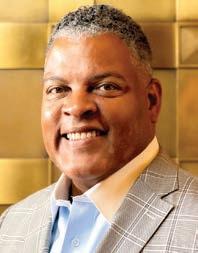
People on the Planet One thing is for sure Black people have always been innovators, creators, and wealth builders. Today, there are an estimated 140,918 Blackowned businesses generating $141.1 billion in annual revenue. Despite systemic barriers, Black entrepreneurs continue to push forward, proving that ownership is the key to economic freedom. Real estate is one of the most powerful wealth building tools available, but tradi-
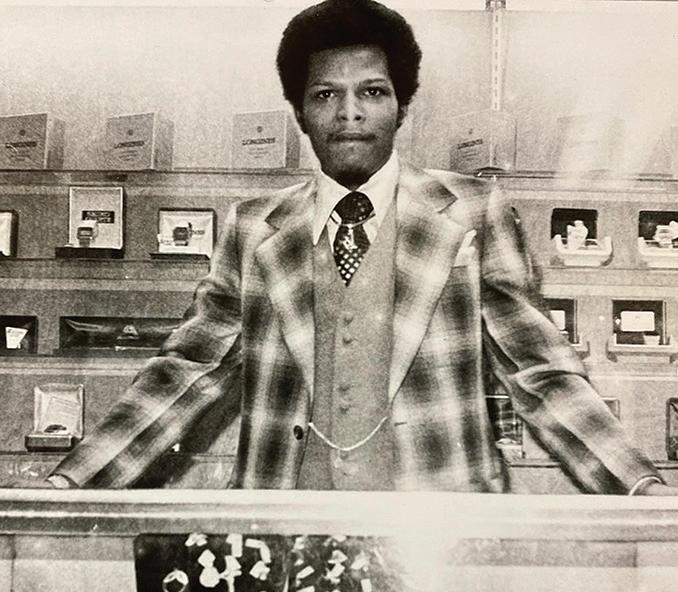
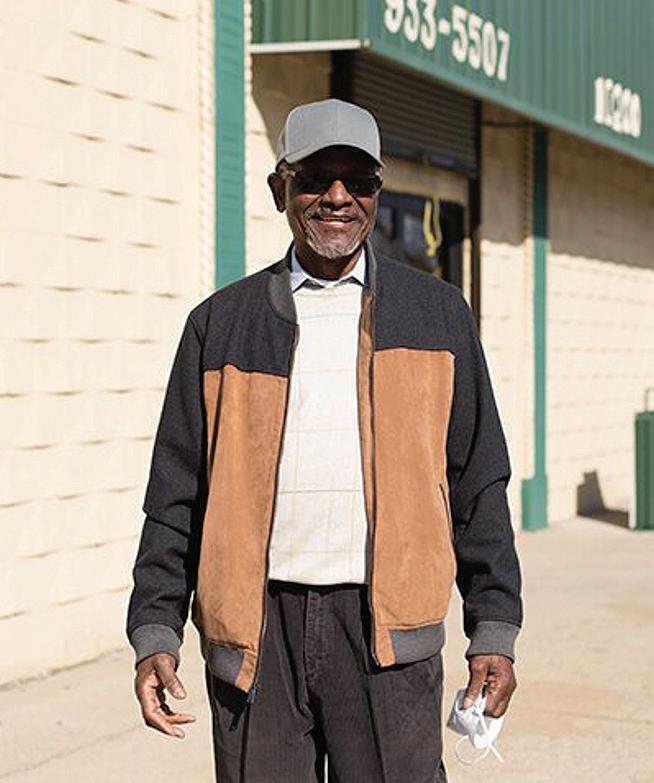
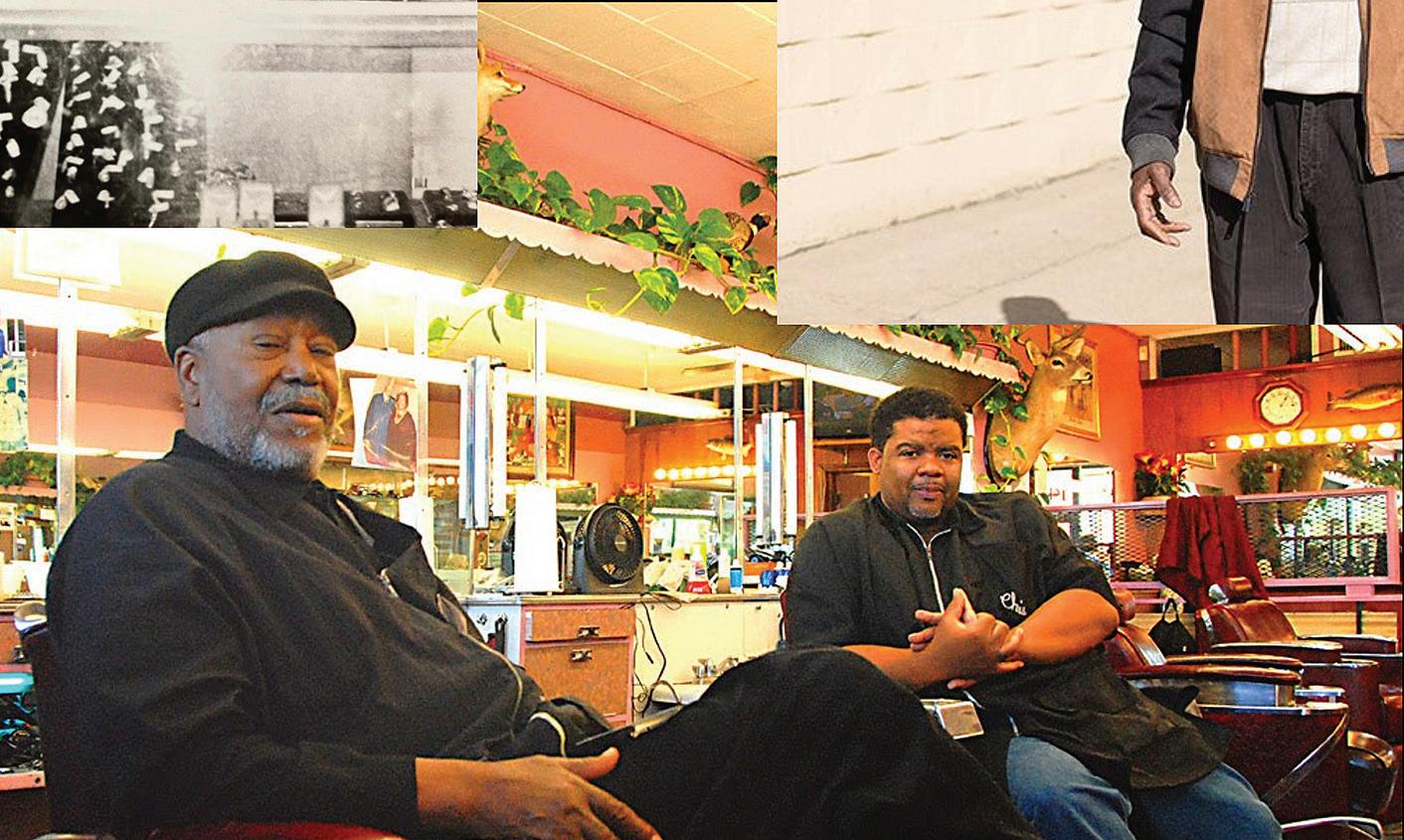
By Ebony JJ Curry SENIOR REPORTER
Legacy moves forward when the next generation refuses to let it stand still. Detroit’s Black-owned businesses are more than brick and mortar—they are cultural landmarks, economic engines, and pillars of the community. This is part two of a continuing series on Detroit’s Black generational businesses, highlighting those who have cemented their place in the city’s history while forging new paths forward. The stories of Baker’s Bible and Bookstore, Harry’s Barbershop, and Chapman’s Jewelry represent the deep roots of entrepreneurship, resilience, and community. These businesses continue to thrive because of a commitment to excellence, legacy, and the people they serve.
Chapman’s Jewelry has been family-owned since the 1960s, built on Eli Chapman’s vision of ownership and generational wealth. A bus driver by trade, he understood the value of having something to pass down. His grandson, Max Chapman, now runs the business alongside his brother and cousin, upholding the same values that built its foundation.
“Chapman’s Jewelry was started in the 1960s in Detroit by my grandfather Eli Chapman with the intention of building something that he could pass along to his sons. He was a bus driver for the city of Detroit but always had a vision and strong entrepreneurial spirit. I am very honored, along with my brother and cousin, to continue that legacy today as the third generation of owners of Chapman’s Jewelry,” said Chapman.
Chapman’s Jewelry represents a long-standing commitment to family and community.
“For our family, the business has been so instrumental in allowing us to not only work and build together as a family, but also to pour into the community that we serve. We are blessed to have so many long-standing clients
tional lending requirements often create roadblocks for Black investors. Enter the DSCR loan… a game-changing financial tool that removes many of the obstacles that have historically kept us out.
What Is a DSCR Loan?
A Debt Service Coverage Ratio (DSCR) loan is a type of real estate loan designed specifically for investors. Unlike traditional mortgages, which require income verification, tax returns, and W-2s, a DSCR loan focuses on the income generated by the investment property itself rather than the borrower’s personal income. In other words, if the property makes money, you qualify. DSCR Loan Requirements No Traditional Documentation Needed
What makes a DSCR loan different? It eliminates the red tape that can make securing financing difficult. Here’s what you need to know:
• No proof of personal income required
• No W-2s, tax returns, or pay stubs
• Loan approval is based on the property’s income potential
who have been with us from the beginning. I think for me as a third-generation owner, it is always gratifying to see people come in with Jewelry or watches that they bought from my uncle or my grandfather over 30 years ago.”
Chapman acknowledged the city’s role in supporting legacy businesses. “We are very thankful to the city of Detroit, Council President Mary Sheffield, and Lauren Stovall with the Institute of Legacy Preservation for supporting us, and really seeing us as valued drivers of our city economy. I think legacy businesses offer a unique glimpse into the past in a lot of ways because our core values of offering great customer service and high-quality products have stayed the same through multiple generations. I would also say we represent a look into the future because we all share the common goal of wanting to continue to grow and take the next steps forward. We want to be leaders and continue to drive the city forward. I don’t know that any of that is possible without not only the support of the city of Detroit but also so many great people who have continued to patronize our businesses over the years.”
Harry’s Barbershop has been in its current location at 14512 Mack Ave. since May 1977. “Prior to that, our late dad, Curtis Harry, opened his first brick and mortar not too far away, on Freud and Lenox. We have been in the community for decades,” said Kimberly Harry. “Our dad believed in community, he believed in hard work and perseverance, he believed in being authentic and providing his customers with top-notch service. He also believed in networking and working collaboratively with the community.”
Harry’s Barbershop continues to be a space where connections are built and knowledge is passed down. “Not only did customers receive a great haircut, but often great advice, and lifelong lessons—something they looked forward
Key Loan Terms for DSCR Loans
Understanding these loan terms will
help you determine if a DSCR loan is right for you:
• FICO Score: Most lenders require a minimum credit score of 620-680, though better rates come with higher scores.
• Loan-to-Value (LTV): Lenders typically finance 75-80% of the property’s value, meaning you’ll need a 20-25% down payment.
• Required Documents: Instead of traditional income documents, you’ll need:
• Rent roll (showing rental income)
• Lease agreements
• Property appraisal
• Bank statements (funds to close)
How Can DSCR Loans Help the Black Community? Property is Power. Real estate ownership is one of the fastest ways to build generational wealth, yet Black investors often struggle to secure traditional financing due to outdated lending practices and systemic biases. DSCR loans provide a path-
to! It remains a place where customers and neighbors can stop in for a haircut, stop in to talk politics or to hear a good joke, or just great conversation. It was and remains a cornerstone of the community. Honesty, authenticity, and hard work! Our dad believed you never meet a stranger...everyone must be treated with respect and dignity. He believed and always honored that philosophy.”
Harry’s Barbershop has become a multigenerational tradition. “There are people who fondly remember their very first haircut at Harry’s, and many of those same customers have brought their sons and grandsons to Harry’s. It’s part of a family tradition that continues. Harry’s Barbershop has always been about serving the community, and that will be our continued focus moving forward.”
Walter Baker’s passion for entrepreneurship started early. Raised in Alabama, Baker and his family moved to Detroit when he was nine years old. By age 11, he had established his own paper route and was actively learning how to generate profits and build up a consistent clientele. “I learned from being a paperboy how to manage pennies. Back then you made three cents on a paper,” Baker recalled. “So I learned how to keep my paper route booked.”
Over the years, Baker’s interest in entrepreneurship grew as he enrolled in business and vocational classes in high school. By 1970, Baker got the chance to put his business acumen to work in the real world. “I went to visit my grandmother in Alabama and had the opportunity to purchase a [sundries] store,” he said.
Jumping on the opportunity, Baker spent the next seven years navigating the world of small business ownership as he ran the brick-and-mortar store and gained important skills that would
way to ownership without the typical income barriers.
• More Black investors can enter real estate without worrying about proving traditional employment.
• More rental properties can be acquired and owned by Black entrepreneurs, keeping wealth circulating in our communities.
• Black neighborhoods can see revitalization as more investors use DSCR loans to purchase and renovate.
A Powerful Tool for Change I personally believe DSCR loans are one of the most powerful financing tools available today. They level the playing field, allowing Black investors to grow their portfolios, increase cash flow, and reclaim ownership of our communities. With the right knowledge and resources, we can and will use this financial tool to empower ourselves, our families, and future generations. Because at the end of the day… Property is Power!
From page A-5
stay with him over a lifetime in business.
“I learned quite a bit about business at the market,” he said. “How to go about calculating percentages, how to go about marking up [products], and things you’ve got to do in business.”
By 1978, Baker was ready to explore new avenues of entrepreneurship. After selling the general store in Alabama, he returned to Detroit and spent the next 15 years earning trade licenses and working as a self-employed contractor. In 1993, Baker found his calling when he opened Baker’s Bible and Bookstore at 10200 Grand River Ave.
“We are in our second generation and thank God daily for simply still being here! It’s a blessing,” shared Carla Baker.
In the early 1990s, after saving money to invest in a business together with his daughter, Carla, and son, Kelsey, Baker called a family meeting to discuss ideas. “We had some options, and we settled on the bookstore because we are, of course, very religious people.”
“As a family, we all kind of came together and said, ‘hey, we want to support this and want to do what we can to create a family business,’” Carla Baker recalled. The book-
store, which has remained in the same location in Detroit since it opened over 27 years ago, quickly established itself as a popular resource for the city’s religious community.
These businesses stand as living proof of what it means to build something that outlives you. Detroit recognizes their value, and through the city’s grant program, they have received the investment needed to continue their work. Over $300,000 in grants have been awarded to 16 legacy businesses to assist with building beautification, business consulting, and operational improvements. This investment ensures that these businesses continue to serve their communities for generations to come.
Detroit’s Black-owned businesses represent decades of resilience, hard work, and community engagement. Their success is a reminder that legacy is carried forward through intention, dedication, and the willingness to adapt. The next generation is watching, learning, and preparing to take the baton. This is what legacy in motion looks like.
This is the second story in a series of second-generation Black-owned businesses in Southeastern Michigan. If you’re a second or third-generation Black owner of a family business that’s been handed down, please reach out to Ebony JJ Curry at ecurry@ michronicle.com.
From page A-5
flict and Disagreement
The more people living in a home, the more likely they’ll face conflicting financial priorities. Navigating disagreements over spending habits and adapting to changing income levels or unexpected expenses are necessary to maintain financial stability in multigenerational households.
Future Planning is Vital
Estate plans should be tailored to accommodate the financial needs and goals of each generation within the household and strategies
should be developed for transferring ownership of businesses or properties to ensure continuity and preserve the family’s legacy. Make sure to compile essential legal documents -- including wills, trusts, powers of attorney and health care directives -- to outline the distribution of assets and clarify end-of-life wishes.
The Bottom Line
Multigenerational households can foster financial harmony and wellbeing by accounting for their individual financial goals and their shared responsibilities.
Family members should be clear about plans, needs and expectations to promote financial stability and satisfaction for all. Communicating about these issues early can help avoid tension later on.
By addressing these considerations holistically and prioritizing open discussion and collaboration, multigenerational households can build a solid financial foundation, helping them achieve prosperity and security for their family members now and in the future.
Read more about financial considerations for multigenerational households at chase.com.



What is this About?
As a result of a Michigan Supreme Court decision, in Schafer v Kent County and Hathon v State of Michigan, counties are not allowed to keep profits from tax foreclosed properties so many people may be owed money.
Who is Eligible?
You may be entitled to any remaining proceeds from a foreclosure sale if you owned or had an ownership in interest in a property in Wayne County, Michigan that was foreclosed and sold at auction before December 2020
Remaining proceeds are proceeds left over, if any, after the total amount due to the foreclosing governmental unit (including all costs and expenses incurred in connection with the sale) is paid.
How to Participate
If you want to be eligible to receive any remaining sale proceeds, you must submit a Notice of Intent to Claim Interest in Foreclosure Sales Proceeds (form 6156) no later than March 31, 2025.
How to Submit a Notice of Intent
Information a how to submit a Notice of Intent, obtain a copy of the Notice, FAQs and other documents can be found at WayneCountyForeclosureClaims.com.
Completed forms must be sent or delivered to: The Wayne County Treasurer 400 Monroe, 5th Floor Detroit, MI 48226
By CERTIFIED MAIL or HAND DELIVERY
No later than March 31, 2025.



50 Women Honored in a Soulful Celebration of Black Leadership




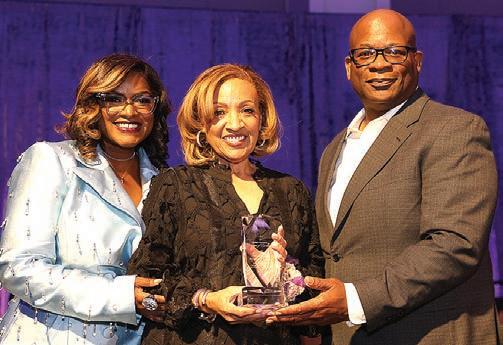









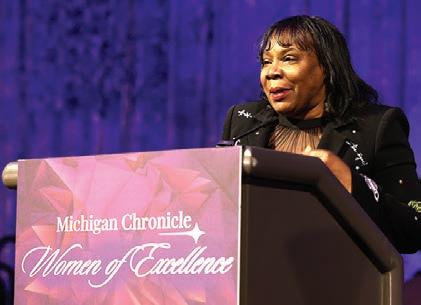



FBy Ebony JJ Curry, Senior Reporter
ifty women stepped into the grand ballroom of Huntington Place, draped in regal hues of purple and gold, embodying the brilliance and resilience that defines Black excellence in Michigan. With 700 attendees standing in ovation, the 18th annual Michigan Chronicle Women of Excellence Awards was more than a ceremony; it was a testament to the power, leadership, and legacy of Black women shaping Southeast Michigan. As the soulful anthem “Calling All the Ladies, Sexy Sexy Ladies” filled the room, a procession of 75 alumni honorees formed a radiant Soul Train line, ushering in the newest inductees as they danced their way to the stage—an entrance befitting the caliber of women being celebrated.
The evening honored individual excellence and the collective impact of Black women shaping Michigan’s industries. Each honoree stood as proof of the doors they forced open, the barriers they dismantled, and the spaces they built for those following in their footsteps. This year’s milestone—900 Women of Excellence honored since the inception of the event—spoke volumes about the movement these women have sustained.
When Wendy Lewis Jackson, Managing Director of the Detroit Program at The Kresge Foundation, took the stage to receive the 2025 Woman of the Year Award, her words resonated through the room. “This honor is a reflection of the collective power we hold when we invest in our communities and our people. Every step forward builds a foundation for the generations who will stand on our shoulders.”
Her leadership at Kresge has been a driving force behind investments that uplift Detroit’s neighborhoods, fund Black businesses, and ensure community-centered philanthropy remains a priority. Her commitment to Detroit’s future is evident in the resources, policies, and programs that directly impact the city’s economic and social landscape.
Linda Forte, retired Senior Vice President of Business Affairs and Chief Diversity Officer at Comerica, was granted the Lifetime Achievement Award. Decades of advocacy in corporate diversity and economic empowerment for Black communities defined her career, and on this night, her legacy was sealed in the archives of Detroit’s most impactful leaders.
The energy in the room never wavered as Charity R. Dean, President and CEO of the Metro Detroit Black Business Alliance, and Renee Fluker, Founder and President of The Midnight Golf Program, received the Vanguard Award. Their work—one strengthening the foundation for Black-owned businesses and the other ensuring Black youth are equipped for college and career success—embodies what it means to pave the way forward.
“Every dollar we invest in Black businesses strengthens our future,” Dean declared, her voice unwavering. “Ownership is power. We will not stop until our businesses are thriving, our communities are whole, and our legacies are secured.”
Fluker, whose Midnight Golf Program has transformed the lives of thousands of young people, spoke with the passion of a woman who has seen the direct impact of her work. “Golf serves as a tool, but the mission is rooted in discipline, access, and opportunity. Every young person I mentor is reminded that they belong in every room they step into.”
Public service leadership was front and center with honorees like Justine Johnson, Chief Mobility Officer for the State of Michigan, and Tiffany J. Gunter, Deputy General Manager and COO at SMART. Their work ensures equity in transportation, proving that mobility is tied to opportunity and empowerment.
Education remains an anchor for change, and honorees like Leenet Campbell Williams, Chief Academic Officer for Detroit Public Schools Community District, and Denise Taliaferro Baszile, Dean of Wayne State University’s College of Education, have committed their careers to breaking systemic barriers in academia. Their presence on the stage was a reminder that education must be an environment where Black students thrive and lead.
As each special honoree stepped forward, their acceptance speeches became lessons in resilience, strategy, and commitment. These were moments of gratitude and declarations of intent—intent to continue the work, uplift the next generation, and cement Black excellence in every sector they touch.
Cathy Nedd, the woman who has long ensured that Black women receive their flowers while they can still smell them, stood at the heart of it all. Year after year, she has cultivated this space where Black women are not just celebrated but documented in history. Under her leadership, this event has become an institution of recognition and an archive of Black women’s power in Detroit.
As the evening drew to a close, the significance of the moment was undeniable. This was more than an awards ceremony—it was a movement, a declaration that Black women are the architects of Michigan’s future. The 900 Women of Excellence honorees are not anomalies; they are the standard, the foundation, and the blueprint.
For those who witnessed this historic night, the message was clear: Black women are the pulse of progress, and their excellence is undeniable. The Michigan Chronicle’s Women of Excellence Awards did more than honor 50 outstanding leaders—it reaffirmed that the power and legacy of Black leadership in Michigan is alive, thriving, and unstoppable.
— PHOTOS: Monica Morgan —


























When The Poke Bowl was planning their business, MEDC was ready to help. We can help your business, too. Get access to growth opportunities, find the best talent, and connect with the right partners. We’re your personal concierge for everything you need to succeed. Seize your opportunity at MICHIGANBUSINESS.ORG

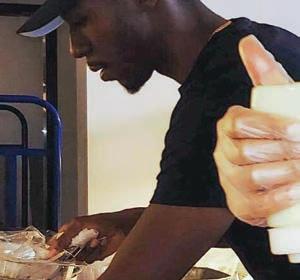
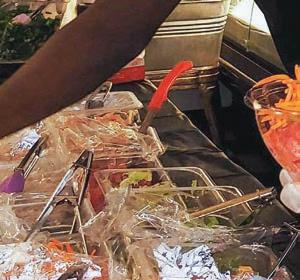


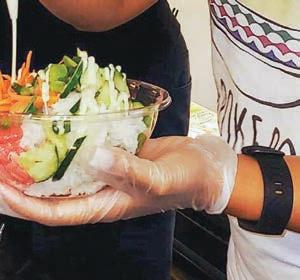








in southwest Detroit, Comerica Bank has partnered with the Southwest Detroit Business Association (SDBA) to host a critical community needs drive, which launched March 10 and will last through April 10 at area participating banking centers, to collect necessities for those in need.
All items collected will be donated to SDBA for distribution based on need. Comerica and SDBA are asking for critical necessities to be donated, including:
• Food/Water: Non-perishable food, bottled water and sports drinks
• Baby Supplies: Diapers, baby formula, baby food (all stages)
• Personal Care Items: Hygiene products, toiletries, laundry supplies and detergent
• Cleaning Supplies: Cleaning products and tools, paper towels, contractor bags, cleaning gloves
• Household Items: Blankets, space heaters, work gloves
• School Supplies
• Pet Supplies: Canned pet food
On Feb. 17, a 54-inch water main break in southwest Detroit initiated massive flooding of several neighborhoods. Flooding was compounded by freezing conditions that affected approximately 400 homes in the emergency flood zone.
“In a great time of need, we are committed to supporting and uniting our community partners and residents to lend a helping hand,” said Steve Davis, Michigan Market President. “Southwest Detroit Business Associations is a crucial community resource aiding residents affected by the flooding. We invite the community at large to utilize our participating banking centers for central donation centers to further assist those who are vulnerable and suffering during this difficult recovery.”
Six Detroit area banking centers will serve as public donation sites.
• Dearborn | Michigan-American: 16150 Michigan Ave., Dearborn, MI 48126
• Detroit | Fort-14th: 2200 W. Fort St., Detroit, MI 48216
• Detroit | Jefferson-Chene: 2631 E. Jefferson, Detroit, MI 48207
• Detroit | Michigan-Central: 7720 Michigan Ave., Detroit, MI 48201
• Melvindale | Melvindale: 18225 Allen Rd. Melvindale, MI 48122
• Taylor | Eureka-Pardee: 14700 Pardee, Taylor, MI 48180 Southwest Detroit Business Association: Established in 1957, the Southwest Detroit Business Association (SDBA) fosters innovation, drive, and commitment. SDBA works with investors, entrepreneurs, customers, and neighbors to capitalize on southwest Detroit’s competitive advantage, while supporting community’s vision for a healthy, vibrant neighborhood. The Association is a coalition of businesses and community interests committed to facilitating the continuation and enhancement of a stable, economically healthy southwest Detroit. SDBA accomplishes this by employing strategies that support existing business and industrial enterprises, enhance the climate for public and private investment and economic growth, and act as a vehicle for cooperative ventures that support economic development in southwest Detroit.
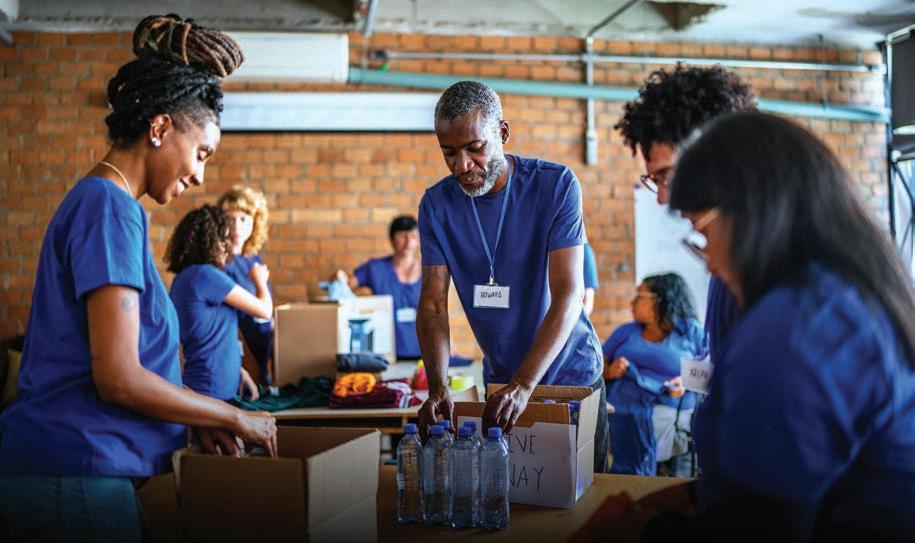


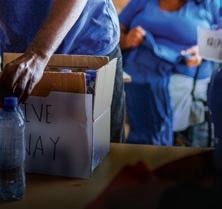

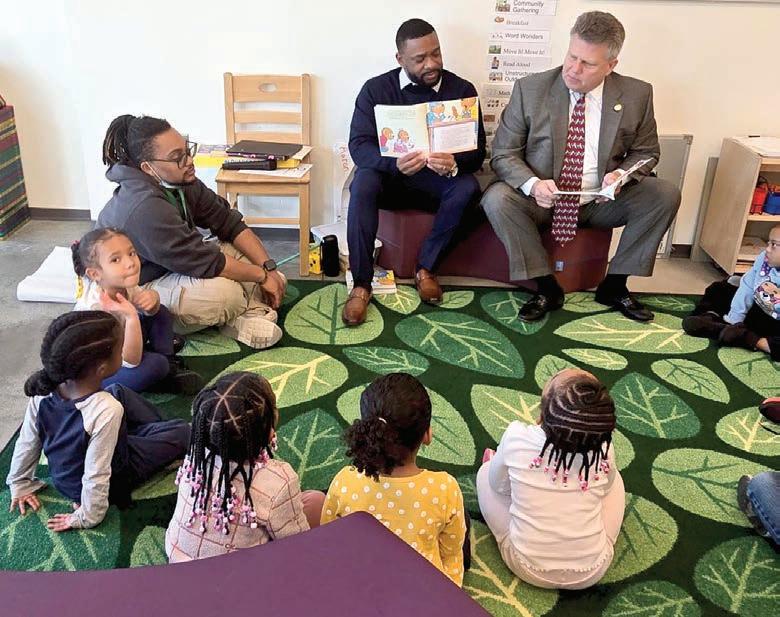
Market Banking
Family Services.
Comerica Bank’s commitment to financial education includes delivering financial empowerment sessions and learning to all ages—from seniors to children at the beginning of journey in school.
March is known as National Reading Month, and the Comerica Financial Education Brigade used the opportunity to bring reading and financial literacy together in partnership with Starfish Family Services.
Comerica colleagues volunteered to read to young students and introduced them to two critical lessons with respect to understanding money, including the difference between needs vs. wants and the subject on how to earn money.
While assisting the young students, Comerica colleagues read the Berenstein Bears “The Trouble with Money.”
“It was an honor to represent March Reading Month at Starfish Family Services, where it was a pleasure to read to young students and introduce them to early financial education,” said Kevin Watkins, Comerica Bank Vice President and External Affairs Market Manager. “I extend my sincere gratitude to our colleagues Antoinette Reid, Shari A Collins and Mike Malaga for their participation and to Kyleen Black for expertly coordinating our efforts.”
The partnership with Starfish Family Services involved two days of reading, including March 10 at the organization’s early childhood education centers at Marygrove (8251 W. McNichols Rd) in Detroit and Hiveley ECE Center in Inkster.
Founded in 1963, Starfish Family Services is a nonprofit human service agency, recognized as a champion for children and families across metro Detroit who have limited access to essential
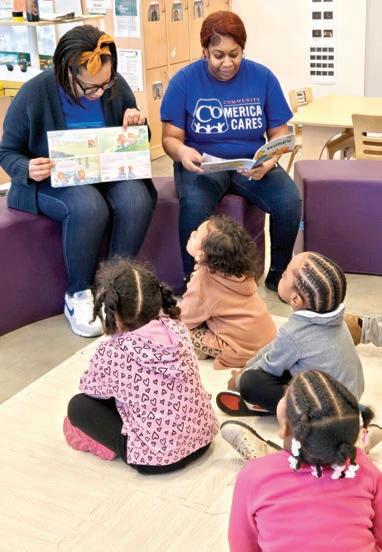
Comerica Financial Education Brigade volunteers Shari A. Collins (Assistant Vice President and Sustainability Compliance Officer) displays pictures as Antoinette Reid (Assistant Vice President and CRA Compliance Specialist) reads the Berenstein Bears “The Trouble with Money.”
ness, and
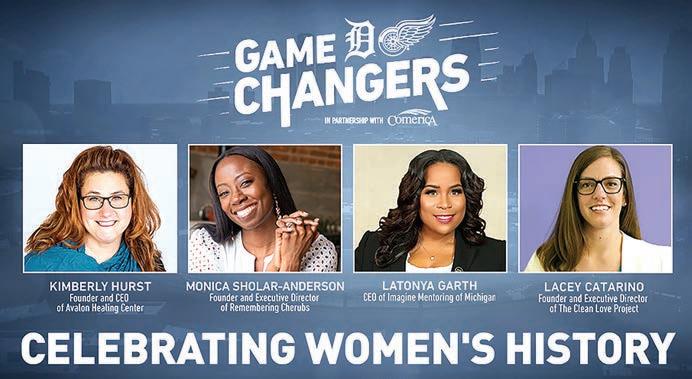
As a part of the Detroit Tigers and Detroit Red Wings ongoing series, in partnership with Comerica Bank, Game Changers identifies and celebrates highly regarded leaders making a profound difference in the lives of others across the state of Michigan throughout the year.
During Women’s History Month, Game
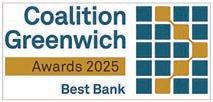
B1 | March 19-25, 2025
By Amber Ogden STAFF WRITER
In a world that has become increasingly more aware of the fashion industry’s environmental footprint, one trailblazing company is igniting a revolution. La’ Merde Designs, founded by visionary Christine Burkette, is not just setting the bar for change; it’s soaring above it with a passionate focus on sustainability but looking stylish while doing it. Launched in August 2024, this innovative brand pays heartfelt tribute to Burkette’s beloved mother, Stella Edwards, while boldly addressing the crucial issue of textile waste. With an unapologetic approach and unwavering commitment to responsible design, La’ Merde Designs is proving that fashion can be a blend of creativity and eco-consciousness.
Drawing inspiration from her mother’s career as a fashion designer, Burkett has combined her passions for science, technology, and style to create a sustainable, high-end clothing line. The genesis of La’ Merde began two years ago when she started researching the devastating impact of textile waste. Alarmed to discover much of the donated clothing ends up polluting communities in countries like Ghana, Burkett knew she had to find a solution.
“I kept saying, okay, now let me look at this through the lens of a chemist,” Burkette said.
“When I started doing my research, I started looking at the best way to do this. I always tell people one of the things that I always notice when it comes to fashion sexy sales. And I said, first, I have to make this company look sexy. And then, I didn’t even have a name for it.”
But not much longer did the idea come to her; whenever Burkette was out in her designs, many would stop her and compliment her by saying, “Your look is the sh*it. Her mother loved French, and that’s how the name La’ Merde Designs was born. In French, it means ‘The Sh*t’
La’ Merde Designs transcends the traditional boundaries of a clothing line by embodying a comprehensive ecosystem that champions sustainability, education, and groundbreaking innovation. Burkette brings a unique perspective to the fashion industry, armed with both a Bachelor’s and a Master’s degree in Chemistry, and is the previous Director of Digital, Equity, and Inclusion for the City of Detroit. Burkette is no stranger to approaching challenges and leaving with a solution. Her passion and background equip her with the scientific acumen necessary to merge the artistry of fashion with environmental conservation.
On a mission to turn discarded materials into stunning highend fashion pieces, each creation looks amazing and carries a meaningful message about renewal and responsibility. The brand focuses on eco-friendly practices throughout its design and production, showing that luxury fashion can also be kind to the environment.
The result? An original collection that stands out in style while promoting a more sustainable future for the fashion industry. It stands out so much that the clothing line has been featured in New York Fashion Week two years in a row.
“When they invited me to New York Fashion Week, I was ready to go, and I was really grateful,” Burkette said.
Statistics from the Environmental Protection Agency (EPA) reveal that the United States generates over 11.3 million tons of textile waste each year. A significant portion of this waste comes from the fast fashion industry, which encourages a cycle of rapid consumption and disposal. This practice leads to environmental contamination and the depletion of natural resources.
“So this is the cycle. You drop it off at Goodwill. Okay, it’s going to a better place. When it doesn’t sell there, they bundle it, and then they ship it over to several countries, like India and


Ghana,” Burkette said.
“And then what happens is those people buy the bundles, anywhere from $5 to $100 for the bundle, not knowing what’s in it. You open up the bundle, and then you sell to the community to get your money back. But then whatever you can’t use goes to landfill waste, so it still ends up in landfill waste, just not in the US.”
Burkette’s vision for La’ Merde Designs goes beyond simply establishing a sustainable fashion brand; it seeks to create a movement that transforms our perception of
clothing. The company takes a multifaceted approach that emphasizes the use of recycled textiles, upcycled couture, and innovative recycling methods, all aimed at closing the loop on textile waste.
“Our goal is to create this circular ecosystem within sustainability to show people that we don’t waste anything,” She said.
At the core of La’ Merde Designs is its dedication to repurposing vintage couture. As environmental concerns grow, brands like La’ Merde Designs are redefining their operations to prioritize sustainability. Founder Burkett combines artistry and innovation by carefully selecting secondhand pieces, digitally designing custom murals and patterns, and collaborating with Detroit artist Fella, who hand-paints each design.
In addition to its couture line, La’ Merde offers a readyto-wear collection made entirely from recycled textiles. By upcycling discarded materials, the brand not only reduces waste but also celebrates creativity and craftsmanship. The Ready-to-Wear collection is refreshed every 30 days, introducing new pieces with unique screen-printed murals, ensuring there is always something fresh and exciting for eco-conscious fashion lovers.
One of the most exciting parts of La’ Merde Designs’ plan for being more eco-friendly is the upcoming launch of a new textile recycling plant, set to open in the last few months of 2025. This facility will help cut down on waste and pollution in the clothing industry. It will collect old and unwanted fabrics, clean them up, and prepare them for recycling. Instead of ending up in landfills, these recycled materials will be sold to manufacturers who can use them to make new clothes. This process will help reduce the need for new resources and lessen the overall waste we produce.
Beyond its positive effects on the environment, the new recycling plant will generate a significant number of sustainable manufacturing jobs, offering valuable employment opportunities for residents in Detroit. By employing local workers, the facility will play a crucial role in revitalizing the city’s economy, stimulating growth, and enhancing the overall quality of life within the community. This initiative not only addresses waste management but also supports the development of a skilled workforce, fostering long-term prosperity and stability in the area.
La’ Merde Designs is dedicated to incorporating sustainability into education and career development. Through its Training and Development Program, the company offers tailored training for aspiring artists,
By Cody Yarbrough CONTRIBUTING WRITER
Spades are a part of the Black identity that I have very little history with. I think Barack Obama was still president the last time I played a full hand. It’s not that I’m bad at it or I don’t like playing. The truth is that, for one reason or another, the game hasn’t been relevant to my social life. Despite the strong cultural significance Spades has had on Black American culture for more than a century now, I’d found myself completely content being divorced with this part of the Black experience. That is until I got an email invite to a Spades night.
It was a closed event at a small business where I knew the owners. No outsiders, no gambling, just some casual cards and maybe some tea. The image on the digital invitation looked more like a young people’s event at a church than a card night in Detroit. Yet despite how laid back the get-together seemed, I couldn’t help but feel taken back with surprise. It had been years since I had even seen a game being played, and that was when the older folks played a few hands at the last family gathering on my father’s side. There was a disconnect between me and this part of my culture that was hard to put my finger on. It was something that the older generations didn’t seem to feel. Learning Spades was a part of life that had just happened to every Black person up until my generation. I wanted to understand it, and moreover, I wanted to be a part of it. My mother once told me about the first time she learned how to play spades. She was raised in the Black church in the ‘70s and ‘80s, meaning that anything that could lead to sin was a sin. Playing card games could lead to gambling, so my mother and her siblings weren’t allowed to play cards. By the time she arrived at Grambling State University in the late 80s, she didn’t even know how to play Go Fish. When the friends she

made there heard this, they were appalled. They quickly took her under their wing and taught her the rules and strategy of the game. Before long, she was up to speed and joining her fellow classmates in games between classes and boning with Black people from across the country over a single shared game.
I didn’t have that experience. There had been a new Black student
union that started at the school where I was studying. Thank God. The college was mostly filled with upper-middle-class white kids, and the few Black people I did bump into seemed more interested in fitting into the lightly veiled racist culture of the school than building community with each other. When I joined the BSU, it was filled with Black people like me. Politically minded, culturally Detroit, and unapologetically Black. We bonded quickly through games of Uno, Chess, and Tunk, and we got to know each other better. It was basically a social club, but to us, it was a safe haven in a hostile environment.
Then, one day, someone asked, “Y’all tryna’ play Spades?” There were about 12 people in the room, and we all turned and looked at him like the kid who reminded the teacher about homework. About two people shrugged their shoulders and said they were down. Me and a couple of others mentioned that we knew how to play but would need a refresher. But the other half of the room had no idea how to even play. Still, there were enough people to put a game together. We got into
designers, and environmental advocates. This program covers all aspects of the business, including upcycling, design, textile recycling, and manufacturing. The initiative aims to prepare individuals for employment within the various divisions of La’ Merde Designs, ensuring that a new generation of creators is equipped to combine creativity with environmental responsibility.
As consumers become increasingly aware of the environmental impact of fast fashion, sustainable alternatives like La’ Merde Designs are emerging as leaders in the movement toward a greener and more ethical fashion industry. By combining fashion innovation with environmental responsibility and investment in local communities, La’ Merde Designs demonstrates that it is possible for luxury and sustainability to coexist harmoniously.
for us to get funding. We’re looking at the Michigan Economic Development Corporation not only for sustainability but as Black owned company. So we’re doing all of our work,” Burkette said.

As Burkette’s vision comes to life, La’ Merde Designs is not just creating beautiful, eco-friendly clothing. It’s creating a legacy for future generations where fashion meets responsibility, style meets sustainability, and innovation drives positive change. She plans to open a textile recycling plant in Detroit that will strip chemicals from materials, allowing the raw components to be resold to the industry. La’ Merde Designs will also launch an educational nonprofit to teach sustainability and eco-friendly practices in local schools.
“People being able to associate La’ Merde Designs by Stella with this amazing woman who raised me is probably going to be my proudest moment, and knowing that whenever anybody wears something their walk away is going to be like lammer day, that’s the sh*t,” Burkette said.

“We’ve gotten a lot of support from sustainable nonprofits, who’s given us funding. We’re constantly reviewing other ways
I
years ago. And the other half of the room, who didn’t know how to play, watched bewildered as the players struggled to put together a coherent hand. In all honesty, I don’t even know if we finished the game. If memory serves me correctly, we went back to playing Uno after that.
That seemingly small moment in my life has always stayed stuck in my head. If we were trying to play Poker or Euchre, then I probably would’ve forgotten about the whole thing
For updates and to shop the online collection, visit https://lamerdedesign.com/ stella-shop.
by now. But it was Spades. A game that, as a Black man, I should’ve known. Or, at the very least, a game that someone from my culture should’ve been able to teach me like they did my mother. Instead, I found that it was a piece of the Black identity that was starting to become irrelevant to my generation. It’s not that we didn’t have the attention spans for it or that we didn’t play card games; we simply had no connection to the game and felt no urge to reach out to it.
Maybe that’s why the tournament invitation caught me so off guard. Most people would see it as nothing more than a simple get-together between friends, but for someone like me, it was a chance to partake in a part of a Black American tradition that is dying with the Gen Zers.
One could write a book
on the many reasons things like Spades, recipes, and old songs are fading from the Black community. Some blame the previous generation for failing as teachers. Some blame the youth for being disinterested in their heritage. There are even a few who blame it on some secret government conspiracy. No matter what the cause of the disconnect is, I decided that I wanted to be one of the people who help preserve that part of the culture.
I went back to the email and messaged them back, telling them that I’d be there at the card night. Even though I’ll be rusty and probably the worst player there, I’m excited to attend and participate in a game that’s lasted generations. Because even if the culture failed me in some ways, I have no intention of failing the culture.



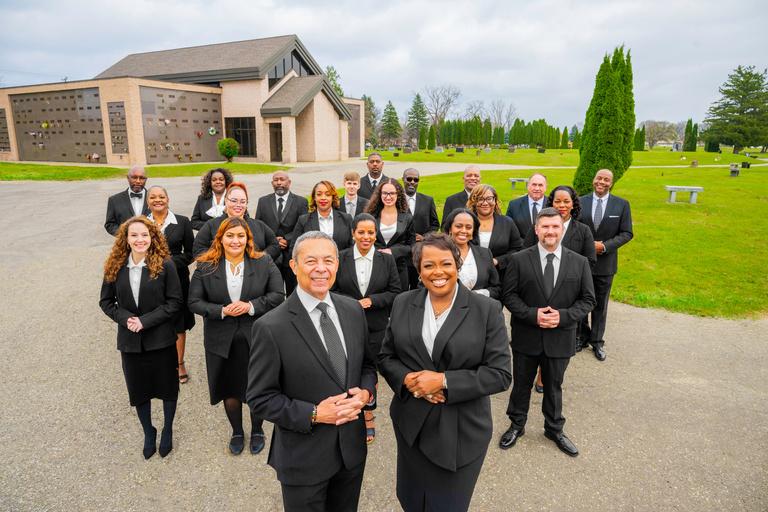
You’re so much more than your diagnosis – you’re our inspiration. At Trinity Health, our cancer care experts combine the latest research and technology with personalized support inspired by you and your unique journey. From diagnosis to treatment and beyond, we’re here to guide you every step of the way with care that nurtures your body, mind and spirit.
Trinity Health Cancer Centers Ann Arbor • Brighton • Canton Chelsea • Livonia • Oakland












DTE Energy is proud to support the Michigan Chronicle’s Pancakes & Politics series. This initiative fosters collaboration to help address issues in our communities and develop innovative solutions for a brighter future.













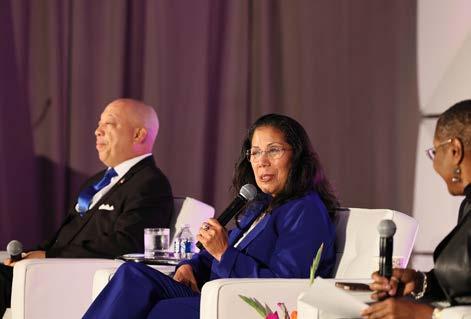






DETROIT COMMUNITY SCHOOLS OPEN ENROLLMENT
Detroit Community Schools, a Tuition-Free Public-School Academy, announces its Open Enrollment period for the 2025-2026 school year for grades K-12. Applications may be picked up at the school, 12675 Burt Rd Detroit, MI 48223, detcomschools.org (313)-537-3570, during Open Enrollment period March 1, 2025 through March 31, 2025 during school hours as well as Thursday, March 13, 2025 from 8 a.m. to 6 p.m. and Saturday, March 15, 2025 from 8 a.m. to 11a.m. If enrollment applications exceed the number of available spaces, a random selection drawing will be held at Detroit Community Schools on April 1, 2025 at 2:00 p. m.
PUBLIC HEARING NOTICE - CITY OF HIGHLAND PARK, Ml
Notice Of A Public Hearing at 13232 Woodward Ave.
• Street & Alley Vacation I The Highland Room I PSA25-0001
• Rezoning to TOSI The Highland Room I PR25-0006
• Parkings Consideration SLU I The Highland Room I PSP25-001
The City of Highland Park Planning Commission will hold a Public Hearing at the regular meeting on 4/9/2025, at 5:30pm. Planning Commission meetings are in person and will be held at, THE HIGHLAND PARK FIRE STATION, TRAINING ROOM, 25 GERALD ST., HIGHLAND PARK, Ml 48203. A public hearing is a portion of a meeting which is dedicated to hearing comments from the public on a specific subject.
Written comments may be sent to the City Planner, Donovan Smith, via email (dsmith@mcka.com) or mail to the City Hall, 12050 Woodward Avenue I Highland Park, Michigan 48203-3578
PUBLIC HEARING NOTICE - CITY OF HIGHLAND PARK, Ml
Notice Of A Public Hearing For Adult CaberetSpecial Land Use at 14001 Woodward Ave Adult Caberet - Special Land Use I Tequilla Downs I PCE-SP-24-0003
The Boggs School’s open application period for the 2025-26 school year is Apr. 1-30, 2025, and our random selection drawing, if needed, will be May 2 at 5pm at the school (7600 Goethe St., Detroit, 48214). Applications are available at the school (8:30am-5pm M-F) or on the website beginning April 1: https://boggsschool.org/ school-information#applications.

Wayne State University has an available position of Research Assistant in Detroit, MI. Position requires a Bachelor’s degree in Health Sciences & 24 months experience as a Research Assistant. Position also requires: Experience must include: 1) 24 mos. exp. conducting research in human sleep. Job duties: Conduct research in human sleep. Analyze sleep & ventilator parameters. Collect data. Maintain research records. Assist with grant & manuscript writing. Prepare & complete forms & applications & follow-up on research protocols. Maintain appropriate patient records for studies or compliance. Assist with training new employees. University policy requires certain persons who are offered employment to undergo a background check, including criminal history check, before starting to work. If you are offered employment, the University will inform you if a background check is required. Qualified candidates should apply through the WSU Online Hiring System for requisition # 2577 at https://jobs.wayne.edu.

1.
connectivity in coffee shops or libraries, where cyber criminals
be
to access your
Instead, it’s safer to
Be cautious of unsolicited emails or messages promising
PUBLIC HEARING NOTICE - CITY OF HIGHLAND PARK, Ml
Notice Of A Public Hearing For Lodging & Boarding SLU at 256 Richton
Lodging & Boarding SLU I Second Chance 2000 I PSLU25-04
The City of Highland Park Planning Commission will hold a Public Hearing at the regular meeting on 4/9/2025, at 5:30pm. Planning Commission meetings are in person and will be held at, THE HIGHLAND PARK FIRE STATION. TRAINING ROOM. 25 GERALD ST., HIGHLAND PARK, Ml 48203. A public hearing is a portion of a meeting which is dedicated to hearing comments from the public on a specific subject. Written comments may be sent to the City Planner, Donovan Smith, via email (dsmith@mcka.com) or mail to the City Hall, 12050 Woodward Avenue I Highland Park, Michigan 48203-3578 Logistics Planner New Boston, MI, Brose North America. Use SAP Enterprise Resource Planning Logistics modules incl. Sales &Distribution, Production Planning &Control, Materials Management (MM), Warehouse Management (WM),
The City of Highland Park Planning Commission will hold a Public Hearing at the regular meeting on 4/9/2025, at 5:30pm. Planning Commission meetings are in person and will be held at, THE HIGHLAND PARK FIRE STATION, TRAINING ROOM, 25 GERALD ST., HIGHLAND PARK, Ml 48203. A public hearing is a portion of a meeting which is dedicated to hearing comments from the public on a specific subject.
Written comments may be sent to the City Planner, Donovan Smith, via email (dsmith@mcka.com) or mail to the City Hall, 12050 Woodward Avenue I Highland Park, Michigan 48203-3578



&Controlling, Finance &Just in Sequence (JIS) Mgmt modules, create, &implement
concepts &plans for Just in
(JIT), JIS &batch transportation &dlvry of
&finished goods incl. (carrier plates, harnesses, screws, Direct Current Units, latches, plastic cmpts) to New Boston Plant. Plan &assure transportation &dlvry of finished goods to Brose/Tier I customers &OEM vehicle assy plants.
mfg processes to ensure
mfg principles &participate in internal &customer audit activities according to automot ISO 9001 &ISO TS 16949 Qlty Mfg Syss standards. Bachelor, Business Admin, Logistics, Supply Chain Mgmt, Industrial Engrg, or related. 36 mos exp as Logistics Planner, Logistics Engr, Logistics Coord, or related, using MM &WM modules, &implementing logistics plans for JIT/JIS transportation of raw materials &finished goods to plant, or related. E-mail resume to Jobs@brose.com (Ref#23130-208).
or freebies — if it sounds too good to be true, it probably is. Block and report anything suspicious before deleting it. And ask your provider what services they offer for safe browsing, such as Safe Browsing from T-Mobile 5G Home Internet to block malicious links.
2. Donate only to trusted charities: Before making charitable donations, check online reviews by looking up the organization and “complaint” or “scam,” or use trusted resources like Charity Navigator. Use a credit card instead of a debit card as they offer stronger fraud protections and don’t give scammers direct access to your bank account.
3. Use your wireless provider’s scam protection: Scammers often rely on robocalls and spoofed numbers to make calls look inviting to answer. Most providers have protection from robocalling and spoofing, including T-Mobile and Metro by T-Mobile, which give customers Scam Shield, a free feature that labels scam calls as “Scam Likely.” These calls can be blocked by dialing #662# or turning on Scam Block in the Scam Shield and T-Life apps. Scam Shield blocked 19.8 billion calls in 2023, giving users peace of mind. Lastly, forward suspicious texts to 7726.
4. Monitor deliveries and protect packages: Mail and package theft happen all year round, especially as online shopping continues to grow. Track your shipments in real-time using delivery notifications and apps. Consider installing a smart door camera to monitor activity on your front porch. Many models offer live video feeds and motion detection, sending real-time alerts so you can quickly contact authorities if needed.
5. Stay informed and report suspicious activity: Stay updated on the latest scams with resources like T-Mobile’s Privacy Center and the Federal Trade Commission (FTC). If you encounter suspicious or fraudulent activity, report it to the FTC at ftc.gov/complaint and the National Center for Disaster Fraud. By reporting scams, you can help protect others and reduce the spread of fraudulent schemes.

(StatePoint) If you’ve been watching your wallet, you’re not alone. As Americans continue to navigate inflation, 76% report cutting back on spending, up from 67% in 2024, according to the second annual Wells Fargo Money Study.
The majority of Americans also say they are making tough financial choices to navigate their lives, including delaying plans with hefty price tags, such as travel, homeownership, education, marriage and retirement.
“There is a clear social narrative surrounding the question: ‘do I, and will I, have enough?’ The fact that these questions are being asked is positive because we know the earlier people focus on their money behaviors, the more time they have to course correct to achieve their goals,” said Michael Liersch, head of Advice and Planning at Wells Fargo.
Consumers continue to navigate higher than expected prices
An overwhelming 90% of those surveyed responded they feel “sticker shock” in one or more areas of common spending, including eating out, attending a concert, buying a bottle of water, or downloading a video game, and say actual costs are between 55% and 200% higher than what they expect.
“Spending is one of the most important factors to staying on track,” said Liersch. “I would encourage people to align their spending with what matters most to them.”
Nearly all Americans (94%) acknowledge that they want to do just that: align money choices with their values, and 86% want to be more intentional and thoughtful
about spending.
According to Liersch, “These insights highlight that Americans are not just winging it. They are being extraordinarily introspective as they navigate their financial priorities.”
Americans judge themselves, not others
Money can be an emotional topic, at times inciting envy, anxiety and secretiveness. While 87% of Americans say it makes no difference to them how much money another person has, 56% keep how much they have secret, and 32% of them say it’s because they are trying to avoid people judging them.
Americans also spend time thinking about how much money other people have – and wishing they could have more themselves. Forty-seven percent responded they often feel envious of how much money other people have, 37% admit to obsessing about getting rich, 34% admire social media millionaires, and 23% admit to sometimes overspending just to keep up with people around them.
“Americans appear comfortable with other people being authentic about their financial situation, which is encouraging,” Liersch says. “So now it’s time to overcome self-judgment and reset the frame of reference from others to one’s own personal benchmark.”
Americans want help meeting goals
Eighty-six percent of respondents say they have a clear picture of what they want their money to do for them. And the vast majority are optimistic about how to do it: 87% say now is a good time to save and 65% say now is a good time to invest. Yet 61% say they need a mental reset, and are being held back by such factors
as difficulty changing habits, lack of financial knowledge and other financial responsibilities.
To overcome these challenges, Americans are seeking more financial advice year over year. Last year, 24% said they were seeking more advice from others; this year it’s 36%. Looking across generations, the desire for more advice is higher among teens (54%), gen Z adults (61%) and
At a time when many are feeling cash-strapped, learning new ways to think about and manage money can help you take control of your financial future.
For the full report, visit sites.wf.com/wfmoneystudy-2025.
